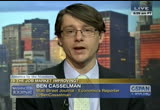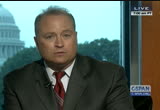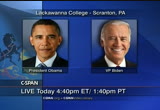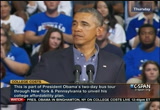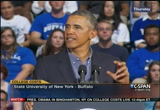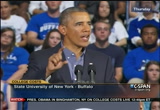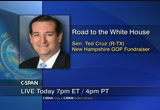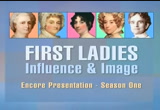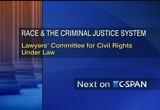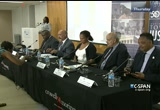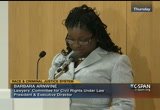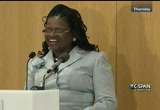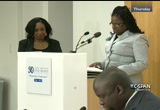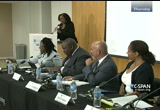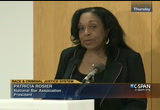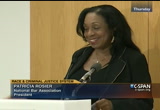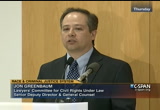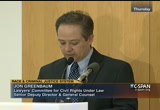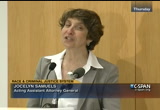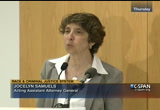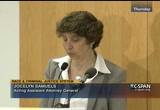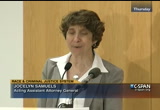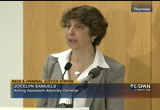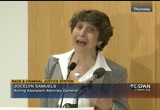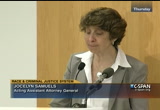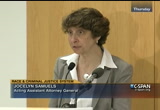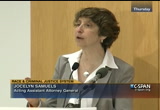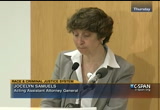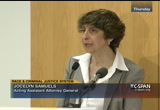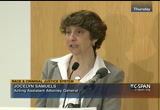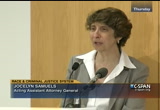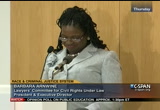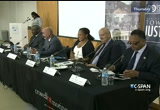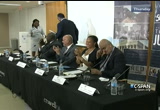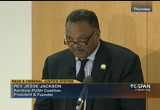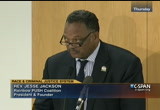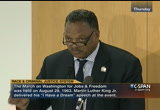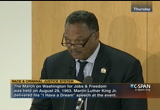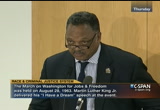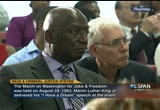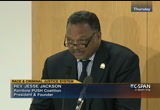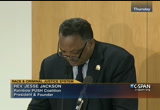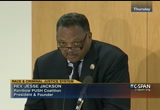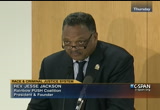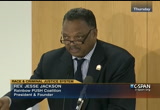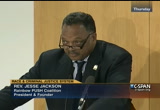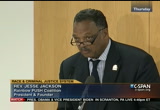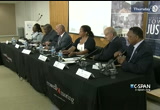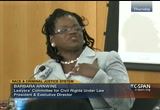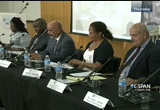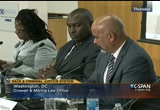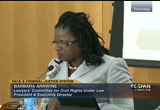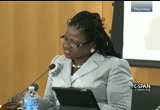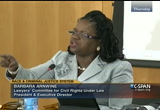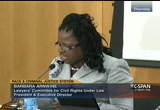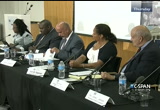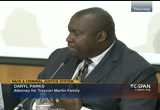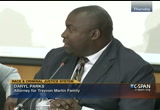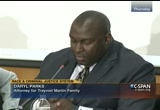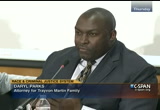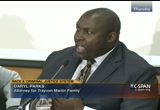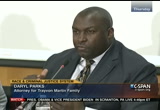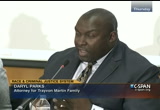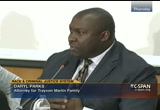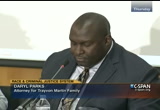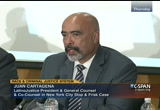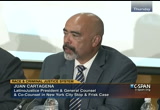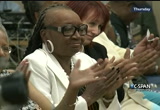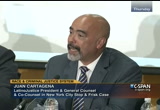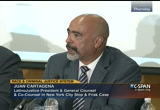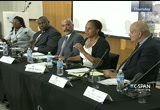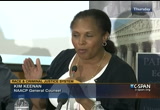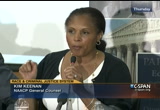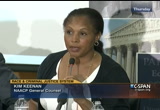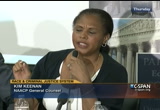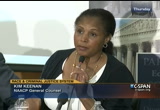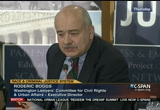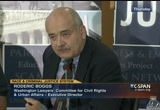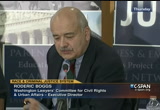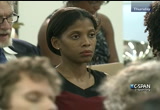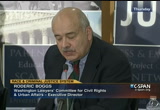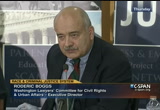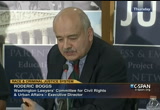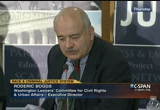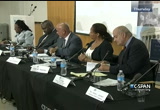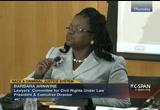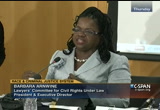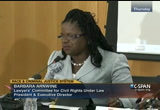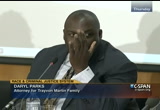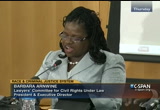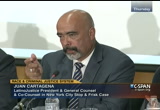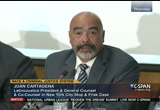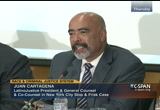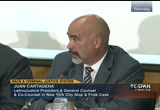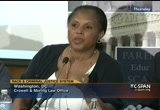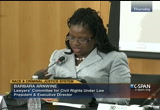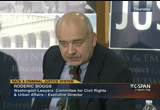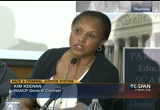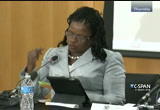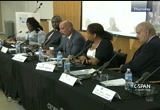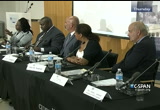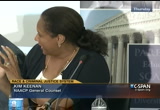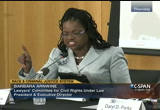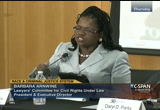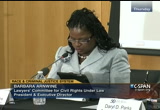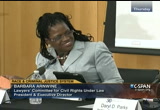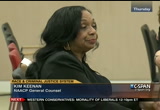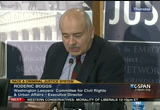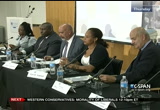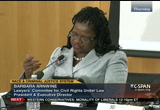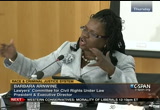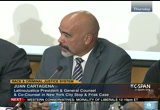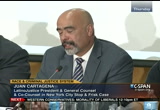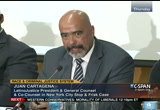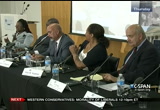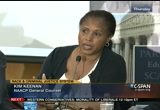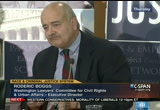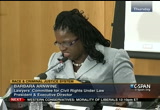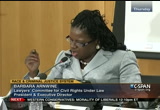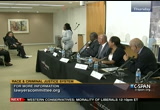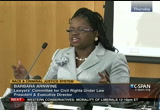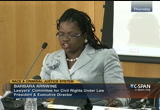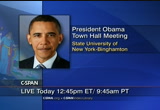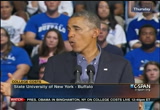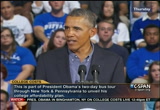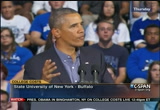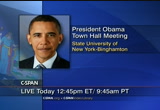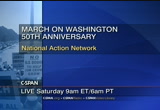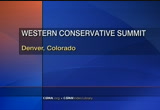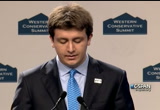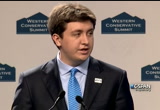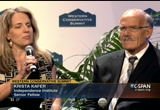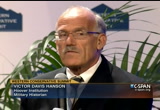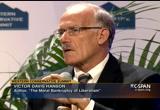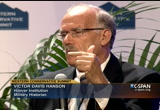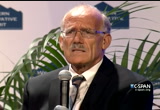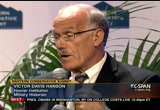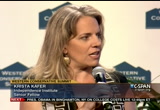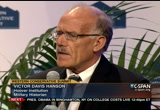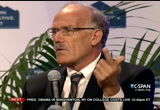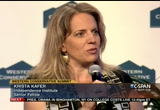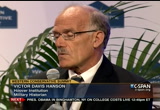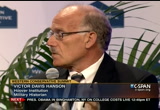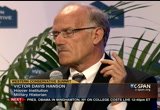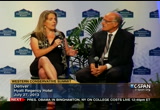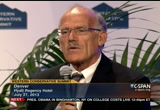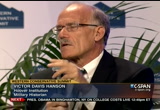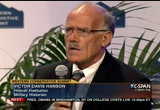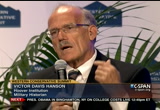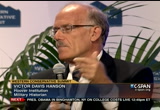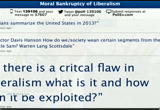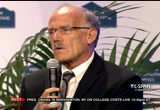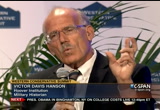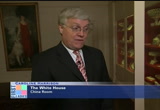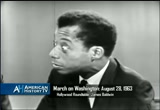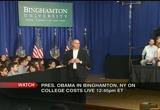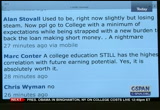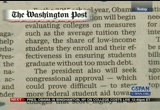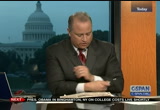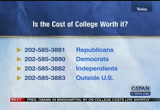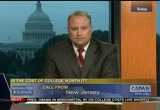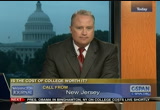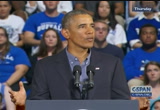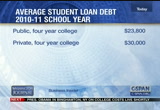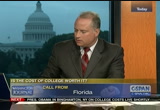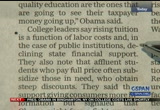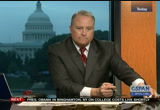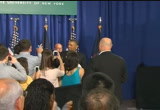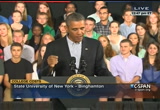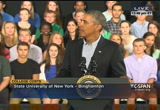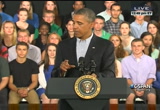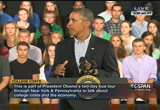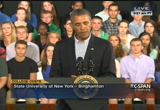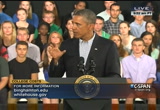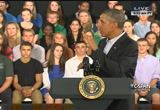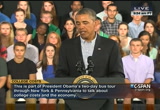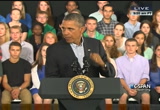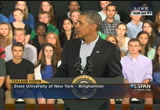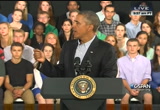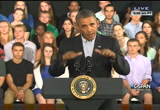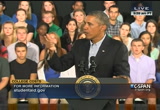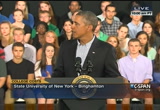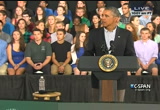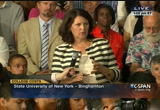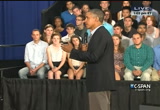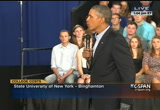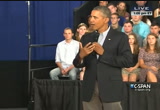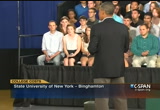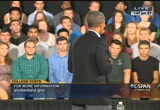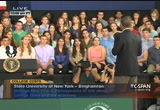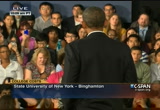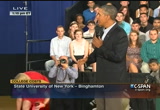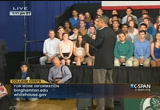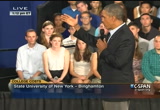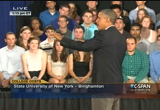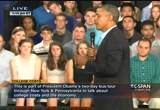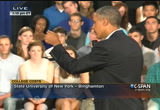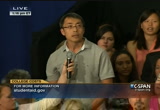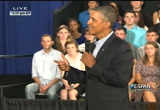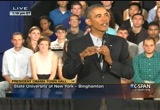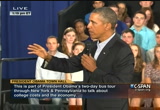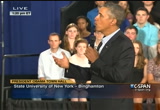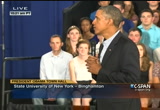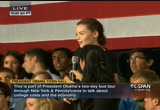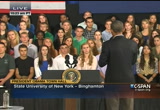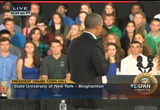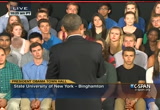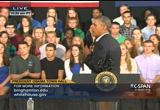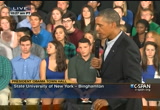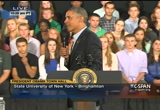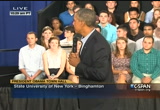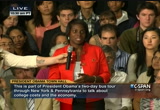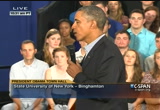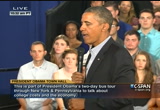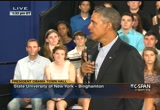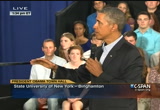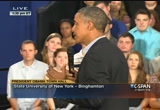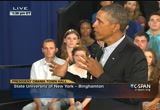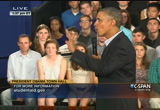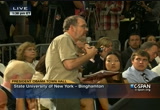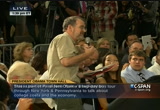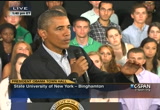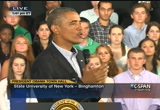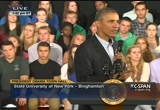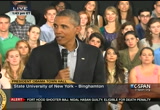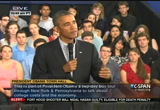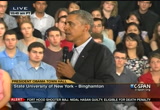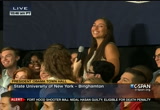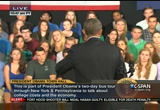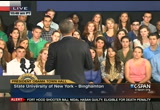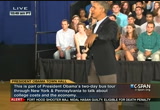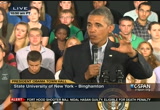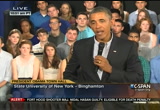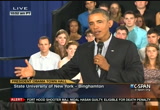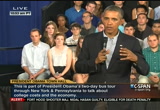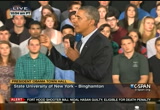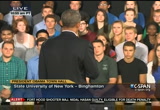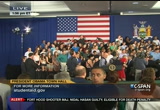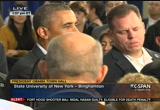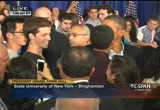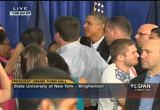tv U.S. House of Representatives CSPAN August 23, 2013 10:00am-2:01pm EDT
10:00 am
there has been some talk about what can be done to encourage people to start businesses, whether the unemployment system is the way to do that probably requires a little bit more work. but i think a lot of economists would argue that it makes sense to look at whether there are ways to design the unemployment system that might align it with what is good host: our guest is then castleman. he is joining us from a new york city. inc. you for your time. -- thank you for your time. guest: thank you for having me on. washington journal starts at 7:00 a.m. eastern time. enjoy your friday. we will see you back here tomorrow at 7:00 a.m. ♪
10:01 am
>> president obama continues his two bus tour focusing on education issues. yesterday he spoke in syracuse. town hall holding a meeting. live coverage at 12:45. most of the presidents tour -- vice president biden is expected to join president obama at lackawanna college. yesterday's first stop, hisident obama revealed plan to control college costs. >> let me talk about these briefing.
10:02 am
our first priority. providing better value for students. making sure parents and taxpayers are getting what we -- what they paid for. there going to lead development to trade a better system for the college year. a lot of colleges are encouraged andnc. -- gaining numbers it is rewarding them on raising cost. i think we should reward colleges based on opportunity. are they helping students? on their value to students and parents -- that means metrics like how much debt does the average student leave with?
10:03 am
how easy is it to pay off? how many students graduate on time? how well do those graduates do in the workforce? the answers will help parents and students figure out how much value a college truly offers. there are schools out there who have terrific values. there are also schools that have higher default rates than graduation rates. taxpayers shouldn't be subsidizing students to go to schools where the kids are graduating. that doesn't do anybody any good. [applause] our ratings will also measure arehow successful colleges in graduating students that are on pell grants. it will increase, not decrease, the opportunities for higher education for students that hit face -- that face other economic
10:04 am
disadvantages. we think of this can empower students and families to make good choices. and it will give any college the chance to show that it's making serious and consistent improvement. so a college may not be where it needs to be right now on value, but they'll have time to try to get better. and we want all the stakeholders in higher education -- students, parents, businesses, college administrators, professors -- to work with secretary duncan on this process. and over the next few months, he's going to host a series of public forums around the country to make sure we get these measures right. and then, over the next few years, we're going to work with congress to use those ratings to change how we allocate federal aid for colleges. we are going to deliver on a promise we made last year, which is colleges that keep their
10:05 am
tuition down and are providing high-quality education are the ones that are going to see their taxpayer funding go up. it is time to stop subsidizing schools that are not producing good results, and reward schools that deliver for american students and our future. president obama at suny buffalo. part of his today bus tour. we will have the first of today's stops here today at 12:45 p.m.. senator ted cruise speaks at a fundraiser in new hampshire. we will have that live for you at 7:00 p.m. reverend jesse jackson speaking at the urban league meeting today. the meeting is in advance of the
10:06 am
50th anniversary of martin luther king's "i have a dream" speech. we are covering that live on c- span two. programming from a southern christian leadership conference. they --ncentrating on race, discrimination, and vote -- and poverty. event marking the 50th anniversary on the march of -- march on washington tomorrow. martin luther king the third, john lewis expected to speak. coverage is live on saturday at 9:00 a.m.. tonight, on first ladies. >> she was fairly interested in how the place work. she came down and found it was dilapidated, dirty.
10:07 am
it was sort of ominous. spruce it up. she found old pieces of china and asked servants if they could remember how old the pieces were. the idea of trying to catalog and create a sense of what the chinas were. she had a plan to put display cases in the state dining room. she is credited with being the initiative -- the initiator of a permanent china collection at the white house. >> that continues tonight at 9:00 p.m. >> the lawyers committee for civil rights under justice held a discussion on thursday on race and the criminal justice system. speakers include joslyn's samuels andjoslyn
10:08 am
trayvon martin's family. >> good evening everyone. thank you for joining us this evening. i would like to remind everyone to put your cell phones, your mobile devices on silent. we are going -- we are very fortunate that c-span is going to be covering this event. put yourage you to mobile devices on silent.
10:09 am
how do i start? what and in porton occasion that brings us all together on this date. we want to thank you for joining us for our discussion on the unjust relationship between race and the criminal justice system. lawyer part of the moving america towards justice series. march onlso a special washington event. to haverivileged today a dynamic group of individuals who will guide our coverage around the complicated tough relationship between race and the criminal justice system. a briefrovide introduction for each panelist.
10:10 am
they will then be allowed a short amount of time to present their area of expertise and focus and then we will open the floor after i have a series of brief questions to the panel. we will open the floor for your questions. i hope that you have gotten the cards and written your questions down. you will be holding them up so our people can collect them and bring them to me to read. before we get to the panel, it is a pleasure for me to introduce the president of the national bar association, patricia rosier. -- i just can't have her come up. she is the president of the
10:11 am
national bar association, the nation's largest association of african american lawyers in justice. portionedicated a major of her life's work to the bar association. she has attended every sincetion of the nba 1980. she began her journey by joining the governments lawyers division. the women's of lawyers division. she became assistant general american general life insurance company. she became a member of the nba board of governors. into the 2012ed washington bar association hall of fame.
10:12 am
although a native of the great state of texas, if you go there, you will see a whole lot. -- she currently resides in maryland. coach,a certified life motivational speaker, author, and collector of vintage movies. please give a hand as we welcome pat rose year -- patricia rosier. [captions copyright national cable satellite corp. 2013] [captioning performed by national captioning institute] good evening. i want to thank barbara arnwine for inviting me to participate. although they will be introduced
10:13 am
later in the panel, i must acknowledge our past presidents who are here today. daryl parks and kim keenan. [applause] throughout its 88 year history, the national bar has always been able to take action to eliminate discrimination. is standingur team our ground for justice. that includes criminal justice. when more african- american men are being incarcerated rather than educated and the number of african-american females being incarcerated is growing at an alarming rate, we must stand our ground to eliminate racial profiling. just as the national bar stood to help change the
10:14 am
disparities in the criminal justice system between crack cocaine and powder cocaine, we will continue to stand our ground to eliminate the disparities that still exist in the application of our criminal laws. the national bar association is ready, willing, and able to .tand its ground for justice we will not be moved. thank you. [applause] at this time, it is my pleasure to introduce john greenbaum, chief counsel to the lawyer's committee. guest fromroduce a the department of justice. john. [applause] >> good evening, everybody. when the history books look at
10:15 am
how president obama moved to america towards racial justice, one of the first things they will look at is eric holder. inhas been such a mover moving this country forward on racial issues. movew another great towards that today when the department of justice filed a lawsuit against texas against their voter id law. the attorney general doesn't do this all by himself. he does it through the civil rights division. , speaking with us tonight, the head of the civil rights division. joslyn samuels. -- jocelyn samuels. she is going to talk about the effort on issues like the cop -- incarceration and limiting
10:16 am
racial disparities. the attorney general gave a speech talking about what the department of justice is going to do to confront these issues. jocelyn samuels is going to talk about those tonight. her background is extraordinary in the area of civil rights. --or to becoming the us is the acting assistant attorney general, she has been part of the leadership of the civil rights division during the entire obama administration. that, ms. samuels was the vice president for education and employment at the national women's law center. to senatoror council ted kennedy. she was the equal opportunity -- opportunityment commission. she has an extraordinary
10:17 am
background in the area of civil rights. she is going to talk to us about the initiative that the justice department is moving forward with. at the end of her presentation, we are going to turn it back to barbara and start our panel. thank you. [applause] >> thank you, john. i appreciate the fact that you did not add to your remarks that i have helped -- that i have helped so many jobs means that i am really old. i am so delighted to be here with all of you. i would like to extend a special thanks and congratulations to the lawyers' committee. it is a huge week for all of us. thank you for inviting me to participate. thank you for all of the work that the lawyers'committee does.
10:18 am
it is so critical to helping eliminate discrimination in this country. here and ited to be thank you all for all of the phenomenal work that you do towards social justice. this is an extraordinary week ago, a weekears from yesterday, we will be have a dr. king's i dream speech. he articulated a vision of the quality that we do today. we have made tremendous strides over the past five decades towards realizing equal justice and he will opportunity. as you are aware, the job is not done. there is much work that remains. we are acutely aware of the impact that the criminal justice
10:19 am
system has on communities of color. there might be no better way to describe that impact then in the words that the attorney general when he gave a speech to the american bar association about two weeks ago in which he announced a serious -- a series of initiatives to address racial disparities in criminal justice proceedings. he said we must confront the reality that once they are in the criminal justice system, people of color often face harsher punishments than their peers. one report released last february indicates that in recent years, black male offenders have received sentences that are nearly 20% longer than white males convicted of similar crimes. unacceptable, it
10:20 am
is shameful. it is unworthy of our great country and our great legal traditions. those were the words of the attorney general. [applause] he also recognized and spoke to the lifelong impact that these disparities in sentencing and harshness in the criminal justice system can have on the lives of people who are subjected to them. -- andsubject people again, he is an eloquent guy, i thought i would just quote from him. a vicious cycle of poverty, criminality, and incarceration traps too many americans and weekends too many communities. many aspects of our criminal justice system may exacerbate these problems rather than alleviate them. that is not what we want our criminal justice system to do.
10:21 am
attorney general holder has announced a series of thatatives, most notably we will not seek mandatory sentences for nonviolent, low-level drug offenders. he has asked u.s. attorneys to up withether to come other recommendations about how to address sentencing disparities. in 2010, the president signed the fair sentencing act which eliminates the five-year mandatory minimum for the position -- the possession of crack cocaine. he reduced the sentencing crack andbetween powder cocaine. -- it to talk a little bit know we're anxious to hear the panel -- about the civil rights work that has been done and will
10:22 am
continue being done over the coming months. are huge problems to confront, i am proud to report that we have enjoyed real successes and made a difference in the lives of people who are subject to unjust and unfair criminal punishment. that unfairness starts with children. we might think that this is just a problem for adults, but in reality, what we see in far too many cases is what has been called the school to prison pipeline. young students peopleortionately young of color, are funneled not into graduation and economic self- sufficiency, but often as discipline for what are minor infractions in school. we have spent a fair amount of time trying to a dress the school to prison pipeline and
10:23 am
the with communities around country to ensure that schools adopt positive behavioral support and other initiatives that will reduce their reliance on law enforcement officers to deal with school discipline matters. it will ensure that they are aware of the ways in which people get funneled into the criminal justice system. we entered into a settlement agreement with the school district in meridian, mississippi, in which we found egregious examples of disproportionate suspension, expulsion, and school-based arrests. a black male high school student was told by one of his teachers that when he got older, he would either be in hell or in jail. andas suspended
10:24 am
subsequently arrested for wearing the wrong socks to school. there was another black male high school student. an administrator asked him to tuck your shirt into his pants. he refused. the principal grabbed him in a headlock and he school security officer sprayed the student with mace. he was arrested and sent to juvenile detention. aree kinds of examples horrible. they have lifelong -- often lifelong consequences for students who are treated in this way. often times, they are unlawful. that is where the justice department can come in. we enforce the laws that bar discrimination by schools based on race, national origin, sex, and religion. that is what we did. we went into meridian, we investigated, we found that black students received harsher
10:25 am
disciplinary consequences. suspensions, than white even when the students were the same school, same ages, and had similar disciplinary issues. we have a far-reaching comprehensive plan with meridian so they can manage school behavior. that is a critical goal. they're going to do it in a way that is fair and avoid a school to prison pipeline. for aged for training appropriate responses for other practices to improve school climate. we called for a clear understanding of the role of school resource officers so they are not used to address school discipline on a regular, everyday basis. data collection and reporting so that we can be sure that they
10:26 am
live up to the commitments that we are pleased that they made. we hope that that settlement will become a model for school districts around the country. we are working with others so that we can ensure that students across the country have the benefit of what we all know works in terms of school disciplinary practices. we are also addressing this from the other end of the pipeline. the juvenile justice and. inch -- the juvenile justice end. we discovered there were huge violations in the juvenile court and juvenile processing system. we found that black youth were statistically more likely than similarly situated whites to be driven into the juvenile system. timelytem failed to hold probable cause hearings for children who were arrested without warrants. they did not protect children from self incrimination during
10:27 am
probation conferences. he did not hold hearings for children before transferring them to adult court. we entered into another comprehensive settlement that will in sure that the juvenile justice system in shelby county, tennessee revise the students the protections that they -- provides the students be protections they deserve. thatcalls for ensuring every child has adequate counsel. one thing we have to ensure is the legal defense system works as it is intended to. people who are accused of crimes have access to the council that they are guaranteed by the constitution. we are working with police departments, biased policing as you know is ineffective. it does not work just -- to serve the goals of the police department. it is unlawful and unfair. we have entered into decrees
10:28 am
with police departments up our -- across the country to ensure and used unbiased methods serve the police department's goals of the effective community safety. finally, we filed a statement of interest in the new york stop and frisk case. the decision came down about 10 days ago. of interest went to the remedies that we thought the court should order. if the judge found that the stop and frisk practices were discriminatory. one of the things that we are urged was that the judge consider appointing an independent monitor to evaluate the did -- did -- the police actions.ts
10:29 am
we found that the monitor is effective in addressing the violation of constitutional rights. they can provide an object does a set -- an objective assessment of whether or not be police department is adhering to the compliance goals of which they have agreed. they can increase community confidence in the meaningfulness of the reform. we were happy to note that the judge in the case not only credited the idea that there should be a monitor and appointed one, that indicated that we should be further involved to consult with the monitor over time. we are looking forward to being involved in that process. for longer than i intended. i apologize. i am going to have to run out. i just want to say in closing, it is our goal to advance dr. to live up to
10:30 am
fundamental ideas of opportunities, equality for all. we welcome your partnership in our efforts. we are grateful for all [applause] >> as everyone has probably observed, we have a very special guest in the audience with us today. to participate on this panel, i .m so delighted he is a native south carolinian , a student leader while at a&t university in greensboro, north carolina. -- he is where he
10:31 am
led marches, protests, was often andatened with discipline reprimanded for his engagement as a student leader. he went on to be, one of the to the dr.fidants reverend martin luther king jr.. marched state after state, city after city with dr. king and in memphis on that tragic april 4 1968, he was there by his side. he thrilled the nation when he ran for president in 1984 and 1988. [applause] he is an international force to be reckoned with. presidents, a
10:32 am
counselor to prime ministers, a counselor to national leaders, internationally, globally, he freed prisoners. anianrabian -- the ir hostages. he freed prisoners in africa facing the death penalty in 2012. he has been a confidant to president clinton, a voice to the voiceless. a hero for our time. i introduce to you and call upon to make remarks, the reverend jesse jackson. [applause] >> good afternoon.
10:33 am
a source of intimidation. and a force for good. matter.voices that operating without a sense of fear and corrupt politics. she stands out and makes all of us feel better about ourselves. give barbara a they can. -- a big hand. [applause] several basic observations. one, i was here in 1963 as a student. i had just left jail in greensboro, north carolina after having left jail in south carolina. duringredentials were
10:34 am
that season. met some friends from around the nation who had come fresh from some jail on the way to some jail, removing fear from their lives. they sought to change the system. one thing i want to say today that is so basic -- i keep hearing people talking about where is the dream? there is no one dream. the dream kept expanding, the dream is a spirit that goes into cracks where there are dark places, searching for the light. 3 was not the196 dream of 1968. the dream of 1963 was dealing with humiliation and barbarism. an opponent mary
10:35 am
washington -- mayor in washington. when the president was led to believe that the march was threatening the airport, the train station, the bus station, on military lockdown. there was so much fear in the air by the government. most d.c. resident did not come to the march because of intimidation on that day. the day that we marched in 1963 was so different. with their food and their cars, you could not buy ice cream at howard johnson. you could not rent a room at holiday inn. gps, you had use a to go by where you could stop at certain restaurants and in certain churches or in certain .elatives' homes
10:36 am
it was not uncommon to see phd's and lawyers and doctors in humiliation. during that day, african- american soldiers had to sit behind p.o.w. -- nazi pow's. basis,uld not perform on -- on bases. at forw's laughter fighting for a country where they did not have at it -- have as many rights as they have. the gay -- the day he gave that speech, a couple was sitting in the park. it was illegal to sit in the park downtown. the park, weset in could not swim in the polls. those are fives that we won. wecould not win -- so --
10:37 am
could not use the roller rink. there were no black jurors in the south. there were no black voters. to be judged by content of character and not color, it was a real time, we could not go to the zoo. most of us could only go to zoos on special days unless they had something else to do that day. then it was canceled. to children could not go stone mountain, georgia themepark. time, itonates and real- was not at all abstract. speech, itthe dream was the broken promise speech. the dream was the climax of creative imagination. after, a hundred
10:38 am
,ears ago, mr. lincoln promised with the emancipation proclamation. we got the proclamation but not the emancipation. congress, you promised, yet here we are today. i dream of a day -- that remains a focus on a dream. there is no budget attached to a dream. there is a budget attached to the broken promises. they remain broken today. unfortunately,t, -- we must not kill the martyr.
10:39 am
he was a cutting-edge leader. the dream in 1963 was against barbarism. the dream in 1964 was a public accommodation bill. the dream in 1965 was the right to vote. we did not understand enough about it to deal with these schemes, it took us 25 years to get past gerrymandering. forget, blacks could not vote. there was no white woman on the supreme court. -- blacks got the right to vote in 1965. the right togot vote in 1970. those serving in vietnam, there was impetus for getting them the right to vote. students could vote on campuses
10:40 am
in 1974. that is what north carolina is seeking to strike down. when you see north carolina moving to take precincts off of campuses, going back to 1974 civil rights case. 1975 -- blacks and white woman and eight-year-old -- and 18- year-olds and congress -- and college students have a role. politics minus that element of people. think about politics minus the black vote, minus the latino vote, minus the freedom of women, minus the 18-year-olds, minus the axis to campuses. that would be a different america. that is the america that is under attack. lastly, i am concerned that we make the right appeals to the president. one of them is that we need --
10:41 am
we have sufficient motivation -- we need public policy declaration. the voting rights act is irv's -- deserves, if it is legal, if there is an amendment for the right to bear arms, there should be an amendment for the right to vote. the right to vote should no longer be a -- be limited to various schemes in various states. we deserve the constitutional right to vote. bereft in whate we need. we need to revive. 100 56 blacks, were shot and killed unarmed by police or security guards or by vigilantes. 136.
10:42 am
the trayvon martin kay's was a perfect storm. that is just a sample of -- the trayvon martin case was a perfect storm. that was just a sample of the violence towards people of color. about theen hit killing in oklahoma, the two blacks and the white kid that was driving. the white kid was an accomplice. he was not charged the same as the others. he was not a part of the three. comparing our slow reaction to that case to the trayvon martin case. is to whitele case kids last june in oklahoma. shot five blacks and killed three. that is the comparable case, not the trayvon martin case. there is noong,
10:43 am
joy, there are no victories. the attempt to destroy it -- to distort reality. if we come out of this week lives, go past memphis for a minute. come to washington. youcould not have stood, will already be at resurrection city. shacks, shanties and from the lincoln memorial, we we broughtthe basin, in native americans and progressive jews and latinos and blacks from the deep south. of civil disobedience. back to the war on poverty. honor the economic
10:44 am
liberating tradition of dr. king in these protests. i cannot help but think that a york, 30 onen new cities were jobless black males are 40% or more. more.ties, 50% or new york is one of those cities. 50% or more black males are jobless. stop and frisk should be stopped unemployed -- stop and employ. [laughter] circle?ave a job do you have health care sir? to go toave a chance school? not stop and frisk, stop and employ. i have watched the liberal
10:45 am
never bring up 50% unemployment. poverty is a factor in this equation. i want to thank you, barbara, for all that you do. tomorrow, we are having another and the votingts rights and poverty tomorrow at the grand hyatt starting at 2:00. try to make that session. we must accept responsibility. not dismiss our children who are athletes as dumb jocks and take what they do for granted. we fought hard for them to get the chance to do what they do. i cannot help but think about the role of jack johnson, reduced to his social life. it was illegal for blacks to changing manikins in
10:46 am
stores. the fact that he married a white woman, it took the culture head- on. createda white man, it riots. force ofe breakthrough his time. he is bigger than chicago. we intend to honor him. and seek his pardon. to you and our fellow panelists, thank you. [applause] >> that was awesome. reverend.so much, at this time, it is my pleasure to introduce our panel. , thet to remind everyone lawyers' committee is cosponsoring with the southern christian leadership conference and rainbow push tomorrow, a
10:47 am
special sports panel. we are going to have nfl great collins,llins -- andre representatives from the nba, bea, boxing, it is going to quite a panel. i hope you will join us. i do serve, in addition to all the other things, i serve as the cochair of the sports commission for rainbow push. i look forward to seeing you tomorrow. please join us at the great hyatt, beginning at 2:15. there will be a town hall on poverty and voting rights, with a reception that evening. , reverend.o much i know that you were scheduled to be gone before now. thank you. [applause] all right. we have a star panel.
10:48 am
we were not playing when we put this together. we have some of the nation's greatest minds and greatest litigators and greatest leaders and lawyers. it is my pleasure, they have traveled from everywhere to be with us. it is such a great honor to recognize them. they are -- their wisdom and sharing their thoughts. first panelist, i am so happy to introduce, is juan car tegena, a constitutional and civil rights attorney who is the president and general counsel to leadinghe nation's that rights law offices represents latinos throughout the united states and works to increase their entry into the legal profession. he recently was -- something
10:49 am
that you have heard about -- last week on tuesday, he was and for the plaintiffs in the new york city stop and frisk case. [applause] he is also a former municipal court judge in public and -- judge in hoboken. lectures at rutgers university. he has written numerous articles on civil rights issues and representation of poor communities, especially puerto rico and latin american -- latino communities. he has recently begun publishing articles on the effect of mass imprisonment on material communities. car me in welcoming juan
10:50 am
tegena. [applause] not to be outdone. a woman of tremendous intellectual prowess. one of the former presidents of association.bar she is the general counsel of the national association for the advancement of colored people, mrs. kim m. keenan. [applause] prior to joining the naacp, she was the principal of the keenan d.c.,nd washington, focusing on medical malpractice litigation. prior to that, she served in the litigation practices of two nationally recognized -- oh -- to recognize nationalize -- two
10:51 am
nationally recognized law firms for 18 years. she is an incredible confidant, a wonderful sister. she is also a member of the board of the lawyers committee for civil rights under law. welcome, kim keenan. [applause] panel. this someone you have seen all over the news. dominated our nation's imagination over the last year. because of a horrible tragedy. one of the family attorneys for trayvon martin. daryl d. parks. [applause] darryl parks a partner in the law firm of parks and crump, llc. they have distinguished themselves as successful
10:52 am
litigators. they practice in florida and the u.s. district courts. as a lifetime member of the national bar association, daryl parks has held leadership positions including been a former president of the national bar. daryl's civic engagement is uncommon. willingness tois make a difference in the lives of others both here and abroad. he has made every lawyer in this country care about social justice. advocacy new form of about how you can really represent a family, how you really can't do this work and make sure that the nation under ash how you really -- how you really can do this work and make sure that the nation
10:53 am
understands. please join me in welcoming daryl d. parks. [applause] last but not least. my colleague in the struggle. boggs. executive director director, a position he has hailed -- he has 1971.ince [applause] we need longtime fighters. it takes multiple generations to win a war. we have to have intergenerational work. he has been an incredibly creative director. he has guided the committee for life,lly its entire developing and expanding its work to cover a wide range of civil rights matters.
10:54 am
the committee has grown from a two lawyer staff with a relatively small docket, to its includingaff of 28, 16 attorneys and a docket of over 100 active cases. in addition to his work in developing the lawyers' agenda, mr.program ings has served as counsel dozens of cases including arguments before several u.s. courts and the u.s. supreme court. you know his cases. with a staff attorney for the national lawyers committee for civil rights. he was the government of forania's -- july he served -- he served for a congressman
10:55 am
in new york. please join me in welcoming rod boggs. [applause] at this time, i am going to start with darrell -- with dar yl. we are going to have each panelist gave a three minute overview of their reflections and concerns about the criminal justice system. the unjust relationship between race and the criminal justice system. >> thank you, barbara. good evening to everyone. i am very happy to be here. to have been very active, especially as nba president. say,id not get a chance to but she has a very interesting program going on with racism in sports, very in line with what you are doing. some chance to collaborate.
10:56 am
>> i think i have another panel. >> i appreciate her leadership in that issue, very important. the sport of soccer as well. when i first became a lawyer, i used to do criminal cases. it tends toou know, be a great training ground for young lawyers. it is a great chance for lawyers to get respect, both was judges and prosecutors. people know that you will try cases. we spent a ton of time in various secure places, trying a litany of different types of cases throughout the state of florida. oftentimes, i wondered, what would it take to change our system. it was not until the country was on the brink of going broke, they started talking about how to reduce the budget, i started a conversation about spending too much money on criminal justice.
10:57 am
it started a small dialogue on the fact that we are spending too much money. practiced law as a young lawyer, we would get involved in these cases that i would call the old burglary cases. in florida, we had a law that said if you were at your girlfriends house and a fight broke out and a minor offense was committed, she told you to leave, charge with burglary. you find yourself facing a life felony because of a domestic situation. that used to bother me a lot. as we began to quit doing as much criminal, i reflected on that. about right now, we have come to a point of trying to find common sense solutions. i have reviewed the problems at three different levels. i have seen the whole issue of criminal justice
10:58 am
system with rays at the law enforcement level. second, at the prosecutor level. race as it relates to our judges. at a law enforcement level, i am rewinding -- i am reminded of one time. i got a call at 3:00 in the morning. i had to read to the police station. there was the cave, the cop, and me.- the kid, the cop,and ifooked at the cop, i said, he tells you the truth, will you let him loose. he let him go. it was a very serious offense. i reflect on that, i would later if you get career, all these other people involved, that never happens. with it right there with that one officer, you have a great shot.
10:59 am
when i get in situations, the sooner we can deal with it, the better. they became so important that we have an advocate for having the right people in law enforcement. there are so many different pick our law we enforcement officers in arbitrary ways. as i have grown as a lawyer and have exposure to situations involving the fbi, i have learned that there is more critical -- it is more critical that we are involved with the fbi. i had a situation where i had a sittingf mine who was a chief of police in a southern town. he had been accused of and pled to a minor offense. the witness wanted to recant because she had lied. when the fbi agent goes to speak with her, the first thing that he said, you changed your testimony, i will take you to jail.
11:00 am
the answer, i will probably not change it. that agent had a chance to do something really good. i was a little bit more involved, i then went to a person who was serving our you guys i said -- have a situation going on. the governor of florida has a lot of power as it relates to elected officials and what he can do to discipline or have some influence on their position. i said you know about the situation, but yet have not moved on that. he said we believe that guy was innocent, but we cannot hit a prosecution from the sheriff's department. that bothered me. roadtook me down the whole that law enforcement can be so positive. the one thing i found was that moving to the prosecutor's side of things, i do not know about
11:01 am
you all, but prosecutors are elected. one issue i have seen is most people who support prosecutors tend to be conservative. there is a person locally in my politics, i would go to fundraisers, and there would be maybeck person but me, or one or two others. that was bothersome because i knew then that people in that room were the people who had the most influence on that prosecutor, and those were his supporters. i could see why his thinking was different because it relates to the election, which is the most important period of their career, so that concerned me. the other way i have look at prosecutors, those who are appointed, and the appointment process. i do not know if you noticed, but the people we tend to put on
11:02 am
the bench play big role. have you thought that the few times we have had a chance to influence the judges is through personal relationships -- or i use in eight different way -- in the appointment process. when people come before my commission, i asked programming questions, which you see sometimes with those you who are lawyers, most of you believe you are judges, that you are qualified to it. that is part of it. i think you want to have a high sense of hutchison this -- consciousness. one of our last guys was a guy from chicago, an interesting story one day. --said he was cellaring serving on an appellate court, and one case was so bad that he released a person from jail. i was so moved by his conviction
11:03 am
on an appellate commission in florida, i did not think eyes all those people who felt compelled by simple justice that.hey woulere led by we should use the opportunity to make those who sit there as judges have a high sense of consciousness about delivering justice, not just about it is time for them to become a judge and they deserve it. we have to put that piece of the puzzle in there, because if you put those people in those equations on that inch, you get our racent effect on in the system. thank you. >> thank you. great, great. >> thank you. good evening, how is everybody
11:04 am
doing? >> good. invited ascky to be part of this panel, and i'm very happy to be here. i am one of the attorneys in a case that is related to and vs. state ofloyd new york, which was ruled that the stop and frisk program in new york city is unconstitutional. i want to ask a question, barbara. system isal justice broken on so many levels that i need to tell you that the system is also broken for latino americans in this country. the exacerbation of a criminal justice -- we might as well call it what it is -- a punishment industry -- because we punish very well in the united states. more per capita than
11:05 am
any country in the world regardless of their despots who might be ruling, the tyrannical people who may rule these countries, oligarchy, dictators -- we put more people behind bars in the united states which becomes an effective social tool, and the it is the same social tool that is visited upon and creates havoc on the african-american community is creating havoc in the latino community as well. as a result, what we are dealing with in new york city is the intersection between policing, which makes sense, and policing which is completely an fm -- and agatha to the issues that have to be addressed in communities. when we see these overreaching results that we see in new york, 4.4 million stops and frisks over the course of years, in
11:06 am
which we are being told by both the mayor and the police commissioner that it is necessary to prevent crime before it happens, which is why we will target black and latino youth and older individuals, not just young people. preemption of cheneyesque proportions. you all know in washington, ec, about the war in iraq. and we need to stop this in new york city. let me end with this quick note. council ofhe city new york, the city council voted just a few hours ago to override the veto of the mayor of new a specialo create monitor at the city level for all policing anti-ad and make sure the racial profiling is also not part of the city's an
11:07 am
initiative code, so it is not used by the police department of new york. the reason why i think that is critical, nice because it is a good decision, but because the city council of the city of new majorityow in 2013 persons of color, and how do you think it happened? because of the voting rights act of 1965, because of section five of the voting rights act in new york city, which applies in three counties. the same individuals who now look like us are acting like us. representing our interests. they are overriding vetoes when it makes sense, and they are finally standing up to the notion that we need to prevent crime before it starts and target black and latino people and make them pay the high price of humiliation, degradation, and dignity in order to " make the city safe." today the city council acted,
11:08 am
because of the voting rights acts that we are able to flex our muscles this way. the other things that happened in new york is when you get the occasional black or latino elected official, they act because of what they have lived. they are lived experiences. governor paterson, a black man from harlem, outlawed the documentation and database of anybody who was stopped and frisks, millions of data entries routing cap, and we believe for all purposes. he made that illegal, they had to get rid of those, because 90% , more, 95% of people who get did not dofrisk do no anything. stoppedrnor said he got and frisk myself.
11:09 am
we finally have people who reelect, who live our same experiences, and who know very well to the direct layer of experience is what it means to be stopped, and it means to be questioned, what it means to be a suspect, even though you have done nothing wrong. finally, the circle of the voting rights act and the circle of policing and just policing and really good policing it has come to fruition. that is what they are dealing with right now in new york city. [applause] i want to pick up where he left off. live in this perfect storm right now, and when i say a perfect storm, i mean 50 years ago they marched for jobs and justice. and even though on saturday people will not have to have food in their cars and there
11:10 am
will be portal upon these and all the hotels are filled if you do not have a room, you cannot get one now, i want you to know that we still need to march for jobs and for justice. the naacp, this job, so whether it is being in sanford because they had to have a hearing because people understood this is not just trayvon martin -- trayvon martin is a symbol of all the other trayvon martin's, because the fact of the matter is that was a community that said this is the last lack oil who will die and no one will know about it. i have had so many murders of black children in that community that were on arm that this was the last straw him and that is the story that nobody really tells, and they had a police chief that was sitting at home because there was nothing to investigate. this is a man who had no
11:11 am
toxicology tests that night. we have no idea about what his blood a call once. you had a community that was fed up and you have those communities all over the country , and the topic today is about how your color impacts your justice. that is so important to cause people forget that. wheree reached the point things have gone so well we forgot to talk about the things that still needed to be done, and because we had to finish. should be50 years about how we finish, because the fact of the matter is we were not finished, and we reached a point in our history or we were not talking about it. , and whethersaid they are brown or yellow or red or black, until we get this right as a nation, a nation that has five percent of the world's population and 25% of the world's prisoners, until we get
11:12 am
this right, we will have to keep doing this. i do not want to be here 50 years from now. i will be old enough that maybe i can make it back, but this is so important because our children are being targeted and the fact of the matter is we need to share these stories. i was going to share briefly something about john mcneil in jordan. this was a man who stood his rant. people work on his property, in his house, and a white man threatened him and his son with a knife. even though he called 911 and even though he fired a warning shot, he continued to advance on this family. and so when mr. mcneal stood his castle-- or the doctorate in georgia -- and shot him and killed him, but when he killed him, he was sentenced to life in prison. when i can tell you for the
11:13 am
record, when the georgia police defense,is self- that is beyond a reasonable doubt. when they get up on the stand and say, yes, it was self- defense, i think the whole trial should and then. after this event happened, after the police rolled it self-defense, he was tried and convicted and sentenced to life. i have to tell you, when people came to me and said it is just to get rid of the appeal and away, i was like he should not be in j and other date anyway. this system was broken. this should not have happened to him. he got life for doing that which you think he should do.
11:14 am
for some reason, in his collar, it did not work well for him. i want you all to see this. if he was older, he was a businessman, he had never been arrested for anything in his life. i tell you these stories, i tell you about marissa surrender in self- -- ishot in say this because these stories say our system is broken. we can do better. we can do better. howard guerre we go across the world and say we believe in justice and democracy when we prevent people from voting, because we do not want to vote in people who will be their judges, who will be there legislators. we do not want that. when did we become that american? i do not believe that is the america we are, and we did to let people know that the true patriots want people able to go and vote because that is how we change all of these other
11:15 am
things. thank you. >> all right. all right. i think everybody would like to get the some questions, but we have all been inspired by these remarks from people i have enormous respect for, and they focused primarily on a very important and unfortunately until recent years not sufficiently discussed national problem. i would like to bring it back, as barbara has asked me to, to the district of colombia and the streets of the lawyers committee because it is instructive and teaches some of the same lessons you have heard, and because there is a movement of good in which each of you could play a part if you lived in the area and want to help us. first thing to say is that although many people understood this until a few weeks ago, when a report was issued that we had envisioned with the help of five distinguished judges, retired and senior judges, and the
11:16 am
assistance of the covington burlington, a lot of people do not understand the dimensions of the inequality which the wasinal justice system bringing on the african-american population. many people do not know that african-american adults now make up less than 50% of the population. the white population of folks over 18 is almost 43%. and yet when you look at arrests in the district, over 80% of those arrested continue to be african-american. people did not understand that 19 of 20 arrests in the district were for nonviolent offenses. they did not understand that 30% of the african-american male population, adult mail population, is arrested every year. they did not understand there are 140,000 arrests in the district to mock and 96% of them for nonviolent offenses.
11:17 am
as one explained in new york, most of these are cases that are never prosecuted, but they leave and armour's percentage of our african-american population with an arrest record with all the problems that encumbers. essentially what we have done in the district, he have done it for most of this time with an african-american mayor, african- counsel, andrity we have criminalized a large percentage of the black population in our city generally for offenses that probably certainly involve unequal enforcement of laws and conduct that should be treated outside of the criminal justice system. what wasgs me to recommended as a result of this study. i want to be sure everybody is aware of it. there was an immediate recommendation to engage in dialogue with law enforcement people of the committee and appointed a committee of four distinguished lawyers and two african-americans lawyers of
11:18 am
including one man who had led the african-american prisoners project, and also william taylor, a former public defender. this group of lawyers has begun a dialogue with the police chief. it is important to talk to people. particularly when results like this around the table. we face a different dynamic than new york. we do not have mayor bloomberg, we do not have the police chief who has thumbed his nose at the african-american community, and a dialogue is beginning which we think will be productive in terms of getting information from the police that will further enable us to understand these extraordinary racial disparities that have been identified. we have begun something where many people might be able to help. a process is underway of community dialogues through out the african-american communities in our city to explain this study, to take testimony from
11:19 am
people who may -- and we are finding have -- had exactly the type of experiences that juan mention made-up litigation in new york. we want to get as much evidence to support that as possible so we can exercise our options to look at things that might be necessary as far as litigation, if we cannot negotiate a solution here. there is also a major effort under way to continue a dialogue in the community involving as many people as possible, including the education -- getting to some of the things that were mentioned by daryl -- talking to prosecutors and judges, to educate that judiciary by having meetings to explain this report to them him and to prosecutors. ae thing to point out is third important recommendations, and one of the most civilian findings here is a huge percentage of the drug arrests in the city, 90% or more, are of
11:20 am
african-americans. generally forcible possession of drugs, which most of us probably would agree should be regulated totally outside the criminal justice system, at least in terms of simple possession is concerned. marijuana being the primary example. the judges who oversaw the issue into this report unanimously endorsed taking the position that all drug cues should be seeing really as a medical problem, as a public-health issue, not as a criminal justice tocern, which has lead incarceration of millions of people in this country, the vast majority being minority peoples over the last decades. i think the movement now, before the d.c. counsel, to decriminalize marijuana is one of the important issues we could imagine because it now has the support not only of the vast majority of the d.c. counsel, and if it is passed, and it will come forward to the council in
11:21 am
september, it will send an important signal nationally us as i think the report that we have issued to call attention to these issues is one that should be repeated in every city in the united states, where these exact same disparities would be found by an examination of the problem. i would close by saying the lawyers committee, the washington lawyers committee, and we cooperate with the national on this, has two further reports. the first is research, and that is a detailed examination of the collateral consequences of an arrest and conviction on people. dramatically impacts and limits the opportunities for housing, employment, public benefits, and virtually everything we need in way of our society to advance. it is probably the single greatest cause of the employment problem that jesse jackson spoke about earlier, and as we all know it is a critical problem. there has been an effort already
11:22 am
in the district to ban the box legislation to provide protections for people with these records in terms of employment. a long distance has to be gone still to get that and acted. save his true in terms of protection for people seeking being able to rent or buy housing. those are among the things that would be looked like in the second study, which has just been commissioned. the third study is an ongoing effort now being committed to the form of study to look at the conditions of confinement, which affect men and women from the district of columbia who are imprisoned. often in the district, that means going to a prison thousands of miles away from their home. there are 8000 district incarcerated individuals in 100 different prisons in different states. the impairment is of this and the problems of this are serous for everyone. the are particularly for serious -- they are particularly serious
11:23 am
for women with children. remember, in the district of aboutia, we are talking the bureau of prisons. i heard jocelyn samuels and i applaud what she had to say. i applaud what the attorney general has announced and what the president is committed to. i would like everybody to remember the issue of drug reform is something that the president of united states and the attorney general had a great deal to say about. they have come nowhere near to utilizing the full range of onir authority to move reform. they frankly have done very little at this point to deal with the reform of the federal prison system, which is really where d.c. -- >> thank you, rod. thank you so much. at this time, if you have a question, you should have one of these cards. please hold them up and they will be collected, and we will start going to the questions.
11:24 am
before i get to the questions, before i get to the questions, a couple of quick things, everyone. first oflt, -- we get a copydo of the report? online, you can download it. >> i recommend everything that you look at the "new york times" from six weeks ago. there was an editorial from the editorial board talking about the fact that in the united states, each year there is arrests for00 marijuana. overwhelmingly, for simple possession. 3/4 of everyone arrested,
11:25 am
everyone arrested is african- american. so we need to be looking at this issue of marijuana incarceration, marijuana differentn, in a different way going forward. and in fact, the editorial concluded that the only thing you could conclude about these statistics is that the use of marijuana could only be classified as "a tool of racial oppression. newhe editorial board, " york times ago we need to be thinking about these issues. also, let me do one really important thing. .e are in a beautiful facility this has been made possible by our board members from this great law firm.
11:26 am
i want to thank mr. andy lew.. i do not know if he is here. he was here earlier. i want to thank andy lew, and i want to thank the law firm of having us here today. i also want to remind everybody we have been talking about the voting rights act over and over again, the lawyers committee, this is one of our huge issues. if you want to know how to help grights tovotin 313131, and you will get alerts and other information. again, text votingrights to 313131. that will get you a alerts. and we will bring perpetuating that number all over the place. so, here is some of our great audience questions.
11:27 am
and i want to thank the audience forn for your patience and being a great audience and being here to help us do things. ok. stand your ground. here is the essence of the question -- if stand your ground was not part of the defense come how was it used as part of the instructions to the jury? simply, it was a part of the actual defense, but for whatever reason, the instructions for the case were very convoluted. they had two days of hearings on the issue. someone decided to use the zimmermanat george had the right to stand his ground, and that was the
11:28 am
terminology used. i think it was planted there for other purposes later. plugged in there for whatever reason. is one ofn this one the questions that the judge actually talked about, i really recommend that if you have not case decision, you want to read it. it is absolutely amazing piece of legal analysis. really, one of the most significant decisions on race and criminal justice in a long time. and this question goes to something she talks about repeatedly in her decision. the neuroaddress bylogy symptoms that result the process of being arrested
11:29 am
and be processed to the criminal justice system? >> what the judge did, and the florida case was worked on by the center for constitutional rights, and the law firm of covington. the floyd case suggestions, the judge recognized the decision in floyd, and decision several months ago that the in dignity and humiliation of being stopped and he obtained by police for no reason whatsoever except that you are a member of a racial harm creates psychological and is devastating. remember that you have to put this in the context of what the city was saying to the world and the city was saying in court. the city was basically arguing that because blacks and latinos andit or are arrested charged with crimes at high levels that we should use that
11:30 am
measure to then figure out who we would target fort stop and frisk practices. it got to the point of absurdity when mayor bloomberg literally said if you look at the people who committed violent crime in city of new york, white folk are being overstocked. yes, he did. city of newn the york are being overstocked excessively. here are the two big points, and this is the point you raise, barbara, on harm. the first issue of the opinion is that i have been saying this for a long time, but i'm not here to decide on the effectiveness of stop and frisk as crime prevention. because there are a lot of things that are effective for crime prevention. you can put people away for decades, right question mark you can force torsion, you can force
11:31 am
a confession. i am only here to decide the a countryonal, and in like ours, it is unconstitutional to stop people and suspect individuals of criminal libel the just because they are members of a particular race. and the second thing she said, which is very telling, is that this notion we can stop individuals in new york because they happen to be members of a racial group, cannot be tied to who commits crime in new york city, because the people that were stopped -- and she said that after nine weeks of trial, 4.4 million files reviewed -- the people that were stopped in new york were innocent, innocent. fact, you were more likely if you are a police officer to find drugs on a person if you stopped them if they were white versus black or latino.
11:32 am
find ae more likely to weapon, a gun, on a person who was stopped if they were white than if they were black or latino. is we cannot permit topect identification data be the litmus test to decide who we stop in the city of new york. those two findings, whoever commits crime is one issue, but city theory has been stopping people who have not committing any crime. the hit rate of stops and frisks were at 12%. 6% were givened, summonses. forle get summonses violations, not crimes. people get picked up in new york city, barbara am a 60% of the time for stop, 60% of after a
11:33 am
stop are arrested for marijuana. you do not know that before you stop them. people get arrested because they have outstanding warrants. a did not know that before they stopped them. thank you. this is not even reasonable suspicion. it is nothing. it is literally two things. you are black or you are latino. that is it. and she said that is unconstitutionally. and that is what we love about this. go ahead, kim. >> in answer to her question, i believe this is a national , and unless we fix this for all of us, it will remain broken for all of us because it is broken for the people who look at the world that way. not only is a broken for them, but it is broken for all the people who are victimized by that way of thinking. to me,t is aational psychic those always
11:34 am
people, it is always then. i got news for you all -- we are inextricably connected in a single garment of destiny, and every time we forget that, we will keep doing it again, and we will keep doing it again until we get it right. >> all right, beautiful. this set of questions are very similar, and i want to ask them in the order that they were received. all of these questions a sickly go to lawyers. the first question, and then i .ave some other questions they said basically, what are the legal strengths that the legal community can pursue that will serve minorities and poor so that there will not be so many crimes, and sentences become less of a concern? what
11:35 am
else can we do. how can a d.c. licensed attorney help the cause of race in this forum? how can legislators be reach out to a sure unfair and biased laws, such as justice reinvestment programs? anybody want to speak on that? >> if you want to talk about the sea, any lawyer who wants to identify with this report said, what the attitude he said, which is now beginning to you with the disparities that we found, particularly the drug laws, it is there to go, you just need to get us on the list and jumped in. the same will be true when the other reports on collateral consequences are done. there will be a range of legislative and policy measures each the more people that endorse them, the more people he mayor about them. the more quickly we can change these things. the marijuana law, the single
11:36 am
biggest law impacting this in terms of arrests, is now up for grabs right now for the d.c. council. we have a chance to change that law over the next three months. more people that say they want to change it, the sooner it is going to get done. >> go ahead. >> we are a volunteer organization, so we take volunteers all the time. good to our website, naacp.org. we have a report am a displaced report,es -- we have a misplaced priorities, and i will tell all the lawyers are, they will say i am not a litigator, i cannot help. that is not true. you have all those other tools in your toolkit, so nobody is saying you have to rush out and file a lawsuit. there are other things you can do, and whether it is a collection protection with barbara, the all participate in election protection, or whether it is adding people off to the march -- i have to make sure
11:37 am
that the permits are right. we need every kind of lawyer there is. you not limit yourself by what kind of law are your you are because we need all kinds of lawyers. >> if i may interject as well, firmsrse the role of law is critical. the lawyers committee celebrated 50 years of excellent work of partnership of law firms. i am sure all this has been saturated to to law firms,. sherman was the office of helpless in that case. litigatorwas also the in the floyd case. these are excellent firms that are living up to the promise of pro bono. >> thank you so much. the other question was the effect, the opposite question, what actions -- or common trick question -- what actions can student groups take to effectiv ely tackle the issues in the criminal justice system? what happenedwas
11:38 am
in tallahassee. >> all right, now. this, thosee say students came mostly in tallahassee, mostly from florida state. we are both pledged in the same chapter. they have been around in activism. and we have a strong streak of activism from student leadership. you have to pick and choose what you do. something --you cannot be discouraged. people in public, you do not have to encourage them. encourage students to stay active in their right, and not everyone will be leaders, but there is a role for everyone. wrote a piece after the activism of the dream act on the issue of immigration reform, and youtitle was and sometimes
11:39 am
follow. i'm old enough to say i've have been lucky enough to be number of to lead a movements and activities and efforts. sometimes i follow, and when it comes to students, at the dream act level, immigration reform, what is happening in tallahassee, we support, we follow them. yet it is students can do, and we do this in all the cities i work in, we do cop watch. these are young people out there with video cameras just recording every engagement between police and regular folk. every engagement gets recorded, and the next thing you know we have a record of what is happening. all these students to be supported. >> i want to make sure that everyone, when you read the order, be sure to read her order on remedy. and thenwo decisions, she has an opinion on remedy. one of these things that she's that she --
11:40 am
orders is the number of police bodyers per recent to wear cameras sewn there can be evidence of how they are interacting with people on the street. and to really monitor the racial elements of that interaction. i wanted to make that clear, because that was one of the judge's recommendations. also that citizens do that. have 1200 adult chapters around the country, we have youth and college chapters campuses in every state and jurisdiction, and those people learn how to organize. they know how to create their college called a the dream team down there and said they are going to dream with them and you thoughts need to watch out because we are going to help them. theg people started movement.
11:41 am
if everybody likes to forget that, but everybody who was here 50 years ago i keep meeting all were 13, 15. they non-people started this and there is a place for them, and there is a place where they can get training, and they might not be leaders, but they will follow and make sure the march has everything it needs. >> thank you. i want to remind people that there is another thing that we can do, not only what the dream defenders have done, they are awesome, but i also wonder my people there is a new movement going around the country called decarcerate. numbere very active in a of states, including pennsylvania and others, and you should go online and look for them because they're home movement is to do mission -- to manage and eliminate the prison- industrial complex. so it is a wonderful movement that looks at how their states
11:42 am
are spending money on prisons, the whole relationship between prisons and profit motives of the states that are making these pledges, that they were produced a percentage of people to be incarcerated for private residence. this is an important movement. you also to join that, and i will tell you, the lawyers committee is looking at a way of really creating a true, powerful gideon's army. we have been talking with michelle alexander. i want you to know that the national bar association, the naacp, and the lawyers committee 2014be launching early in six a on expungement, including program here in the district, working with the programs here
11:43 am
in the district, working creating programs in virginia, helping with the program in maryland, and we will be doing work about wishing forward law reform. the questions i got now will go to law reform, and your they are so everybody can listen to them and i will let the panel answer them and i know we got to let the panelists go in about 10 minutes. andkly, one question -- these are from people -- by the way, i am so appreciative of you. i see people are here from pasadena, california, from all over the country, just thank you for being here. this question is, what is the possibility of a foreign -- of reforming the jury panel to regard revisitation of minority groups and to deal with the issue that some people also have absurd and written about the jury in the zimmerman trial?
11:44 am
thato you get them to sign they will not be influenced improperly, even though they take that pledge now? is there anyway way to amend the sentencing guidelines for illegal drug possession charges, to get rid of these minor offenses? in illinois, there are african -- american -- african american state legislature got to pass a law that required sub-circuit judiciary districts to elect a minority judge -- can that be done anywhere else? the last question they had is a question i think that some of us can answer about what is going on with marissa alexander? is something eating done to get her released? ok, those are the questions, and i will entertain one answer per question. [laughter] >> we have to answer all of them? >> whoever wants to answer.
11:45 am
i know, there were so many. >> the sentencing commission will start hearings and they will start looking at those laws, so i believe the sentencing guidelines, it is about time. i remember being a law clerk and is sentencing guidelines coming out, and ireland were all the federal judges in the united states district work for the district of columbia saying this is bad, these are unconstitutional, and really putting themselves under the flame to say these are wrong and being trounced by both politics and other things, and look at that, here we are, and the sentencing guidelines are being reviewed because they do not work. they are broken, and they really take out the justice. >> thank you. panels ofform in the juries is an important part of the criminal justice system. it is incumbent on all of us
11:46 am
actually to get the message out service ono support juries. i am dying to be on a jury. >> they do not want us. >> i am dying to be on a jury. the fact of the matter is, seriously, the more we get the message out, public service juryncements to my that service is quintessential to a fair system, especially the i, will makeice sure that people do not look that jury service is not critical. learned this the other day from a criminal defense lawyer, which is looking at who is called and who appears, there is a problem in the d.c. system in that african-americans tend to appear for service for reasons that are not totally known at a far lower percentage than white jurors who are called.
11:47 am
in the district, since there is no follow-up to people who do not come and appear, you end up that are fars disproportionately white. approach many ways to that, and one is to get in touch with people to come, but the other thing is to create a much higher level of civil engagement around the duty of serving, because it obviously would make a big difference. >> thank you. thank you. i wanted toncluding ask each panelist to address as we conclude if there was one thing you could do right now to change the criminal justice system, one solution, what would it be? one thing. think about also while i do this thatere were two questions were statements kind of, and so i want to acknowledge them. regarding -- which was
11:48 am
the infamous program of the fbi that was used to blackmail dr. martin luther king come a that was tried to, and that were used to start all kinds of problems and frictions between groups, spies among all kinds of problems. it was a harmful problem, and there are a lot of political prisoners that resulted from some of this, these terrible programs command that is one question about just thinking about what can be done to deal with the whole aftermath of that legacy. the other question went to the disparity, talking about how hard it is for african-americans to file criminal charges against whites. that is a problem in major stations. we recognize -- in many jurisdictions.
11:49 am
we recognize that is something to do. i recognize, everyone, that what i have concluded today is we race inminal justice -- criminal justice panel number 2. we need to keep on this issue, tapped we only really and looked at the tip of the iceberg today. there is a lot more i wanted to talk about. i wanted to talk about the media. i wanted to talk about fear mongering. i wanted to talk about women in the system. there is a whole lot of other -- couldat we did not not get to in this timeframe, but i am here in a legal symposium on this question. dig is so we can really deeply and not just talk about the problems of doing what we are doing now to continue to talk about solutions. and so i want to turn it over to daryl to answer that question, if you have one solution. you can do two.
11:50 am
if you have one or two solutions, what would they be? >> this is a tough question. on to economic politics, those two factors play a role in thist every inhabitant in country and has a direct impact on the criminal justice system. those two things have proved for changedhe numbers have dramatically in criminal justice -- that is my take on it. >> i want to jump in here, barbara. recently we have received reports that the prison population has been going down for three years running. i think those reports however had to do with the federal prison system, which is just a the overall part of incarceration issue in united states, and their core, what the states do it differently.
11:51 am
you might say person who might be overweight to the tune of a thousand pounds just lost 50 pounds is no longer obese. here's my biggest solution, and it is an issue i would love to have further discussion and to hear you talk about, anyone to talk about. the elephant in the room is the war on drugs. the engine that drives criminal justice to my the engine that drives over incarceration, what makes america the land of punishment is this ridiculous notion that whatever a person decides to put in his or her body can somehow be controlled by law enforcement as opposed to medical treatment. until we address the issue of drugs and drug use and what it today in the united states america, the biggest consumer of illegal drugs and anywhere in the world, until we address the issues of border security, there
11:52 am
was a caravan for peace lead froma -- led by a poet mexico. the caravan was people who were coming, families who were lost, family members who have been lost on the mexican side of the border, over 60,000 have been lost in several years, in this ridiculous war regarding drugs. and all they said was one thing -- america, please stop the war on drugs. it is killing our people. gun proliferation is all over mexico. when are we going to do something that is saner question mark i will end with this -- saner? one of the marchers was we came up here to civilize the big place. [speaking in spanish] we came people to civilize, to talk about dealing with drugs differently. because currently, during the
11:53 am
nixon administration, the current way he not working. that is what rise of us, that is what we have to have an honest position about, and i want to be best part.aved the i want to have this conversation without people looking at me like some druggie. -- anan on demand audience member say, you're not on drugs, are you? no. can't we have a saying conversation without people thinking that the only reason i talking about this is because i want a hit? i want to have a sane conversation. this is what drives the united states terminal justice system. until we deal with it, we are not dealing with the problem. >> all right, thank you. [applause] i have one big one and then i'm going to sneak in my second one. my big one is i would expand voting rights. can find my social
11:54 am
security number. my number in kansas and they should be finding it in ac. d.c.. if we make that happen and more people can do that and it is easier and so much better, then school boards to make eric to get educated to keep them out of jail. that is how you change the statistical outcome for men. and we so important, forget all of these basic rights that we take so for granted, from this, that how you pick your police chief, how you decide how the money in your community is spent, that comes from voting. the thing i would stake in from the issue that i was just saying, i would eliminate for- profit prisons.
11:55 am
they are warehousing people. >> all right. yes. >> organize, advocate, create coalitions. the drug war has to stop. the judges that lined up behind a report, five of the most distinguished judges in this jurisdiction, many of whom have been prosecutors, they said it best we have to change the drug laws. they were in favor of looking at legalization of all drugs in a regulated way. one of the options for every drug. until we change these drug lost -- marijuana is key -- we will not put a serious dent in this robert. privateo do away with criminals, have to decriminalize as many offenses as possible, eliminate them. >> all right. thank you. thank you. in closing, a couple of notes. definitely continue to
11:56 am
look at this issue, to advocate, litigate, legislate, do everything we have to do to attack and destroy the prison industrial complex. -- it is very important that we will be looking at every law possible to deal with change and the impact on the war on drugs, and even president clinton, who helped to perpetuate this, has denounced his own actions. we need to end racial profiling, peroiod. end it. it does nothing for law enforcement and safety. we need all the lawyers did dedicate your pro bono time to helping on this issue. do not leave it to these poor, overworked public defenders. we need to take an interest in doing this. te need to change the swa
11:57 am
policies that caused my own home to be invaded, and for me to be guns three hours under and threats of destruction to my family. we need to change so many things , but we also want you to do volunteer with us. we have a school to prison pipeline project that we are running in new jersey. we need a attorney volunteers for that project. we are learning so much about how students get pushed out of school. and denied their opportunities. we know that 80% of every person, 80% of all people incarcerated, lack a high school diploma. the strongest correlation, besides race. at the fact to look that in our country, the average cost to incarcerate a person is
11:58 am
over $30,000. our average expenditure in the united states on students is $10,000, a little bit over. why not have a state law everywhere that says no state can spend more on prisons than it spends on education? these are some of the things that we need to think about, so once again, i want you to join me in thanking this incredible panel. what an incredible honor it has been to serve. we have for you today, as a special momentum, we might just mail it to you, rod. [laughter] yes. and for kim and rod, thank you. everyone, these join in
11:59 am
welcoming this panel, the best panel ever. wonderful, wonderful, wonderful job. the lawyers committee would love to see you tomorrow at the sports panel, where i have mentioned we will have some of the sports legends and greats, and nba player, but also game of change leader. we will have people, the reverend jesse jackson, will be on that panel. there will also be women, , likeible women leaders the founder of the hip-hop union and is also one of the hall of fame collegiate champion ask about players. ba've also have wn representatives. as i mentioned, we will have on re collinsins -- andre
12:00 pm
and we will have other layers from the nda. we will also have the boxing industry represented. on october 20 four, mark your calendar right now, october 24, and howard university will be hosting a legal symposium all day, looking at the last term of the supreme court, in particular, but looking deeply at issues around voting rights, affirmative action -- help me, john. environmental justice, immigration, lgbt issues. we hope you will join us on october 24 for our free vehicle symposium. it has been an honor. thank you for being the best audience possible and i loved your questions.
12:01 pm
deep rocking and rolling. let's change america. thank you. [applause] >> president obama continues his to-day bus tour focusing on education issues and college costs. this morning he surprised the soccer team at a central high school getting ready for the season. he is on his way to the state university of binghamton, new york hold a town hall meeting and we will have that live at 12:45. later, a stop in scranton, pennsylvania. the vice president is expected to join president obama at that event. that is live as well.
12:02 pm
yesterday, his first up and bustle of -- buffalo, he revealed his plan to control costs. aimed first priority is at providing better value for students. making sure families and taxpayers are getting what we paid for. duncan'm directing arnie to lead an effort to develop a new rating system for meccas colleges before the 2015 college year. right now have it rankings like u.s. news & world report puts andeach year their rankings encourages a lot of colleges to focus on ways on how we gain the numbers and it actually rewards them in some cases for raising cost. rate collegesuld based on opportunity. are they helping students from all kind of background succeed? [applause]
12:03 pm
and on their value to students and parents. that means metrics like, how much debt does the average student we've with? how easy is it to pay off? how many students rajoy on time? how well do they do in the workforce? because the answers will help parents and students figure out how much i a college truly offers. there are schools out there who are terrific values. but there are also schools out there who have higher default rates than graduation rates. and taxpayers should not be subsidizing students to go to schools where the kids aren't graduating. that doesn't do anybody any good. [applause] and our ratings will also measure how successful colleges are and graduating students on
12:04 pm
pell grants. it will be my firm principal ratings have to be carefully designed to increase the opportunities for higher education for students who face economic or other disadvantages. [applause] this is can it take a little can, but we think this empower students and families to make good choices. college thegive any chance to show it is making serious and consistent improvement, so they may not -- a college may not be where it needs to be right now on value, but they will have time to try to get better. stakeholdersll the in higher education -- students, parents, businesses, collagen as traitors, professors -- to work with secretary duncan on this process. he will host a series of public forms around the country to make sure we get these measures right . over the next few years, we are
12:05 pm
going to work with congress to use these ratings to change how we allocate federal aid for colleges. we are going to deliver on a promise i made last year. [applause] deliver on ato promise i made last year, which is colleges that keep their tuition down and are providing high-quality education are the ones that will see their taxpayer funding go up. it is time to stop subsidizing schools that are not producing good results and reward schools that deliver for america students for our future. [applause] president obama from yesterday. he is on his way to binghamton for more comments on college costs and educational policies, live at 12:45 here on c-span. our coverage continues tonight which you'll be potential, republican senator ted cruz speaking at a fundraiser in dublin, new hampshire, live at 7:00 a.m. eastern.
12:06 pm
of next week's march on washington, the national urban league is hosting a discussion of meeting in washington today and underway at this hour in advance of the 50th anniversary of martin luther king, junior's speech from 1963. you can follow that live on c- span2. more related programming from the southern christian leadership conference, their 57th and a convention with a focus on race, poverty, and voting rights among issues. we will have that life read a 4:00 p.m. eastern also on c- span2. events marking the 50th anniversary of the march on washington continue on saturday with an event at the lincoln memorial. among the speech or is, martin luther king iii and john lewis. that begins at 9:00 a.m. eastern tomorrow. ladies," --n "first >> she was interested in how the
12:07 pm
place worked. she found it was rather dilapidated, dirty, sort of .minous she tried to spruce it up. she found a piece is of china in the cabinets and then asked service if they could tell her if anyone remember how old the peace is. she tried the idea of trying to catalog and create a sense of what the chinas were. themad a plan of putting on display the state dining room, but it never came to fruition. she is credited with being the initiator of a concept of a china collection at the white house. >> the encore presentation of our original series continues tonight on 9:00 eastern on c- span. >> recently, victor davis hanson talked about the moral bankruptcy of liberalism at the annual western conservative summit hosted by the colorado christian university centennial institute.
12:08 pm
he criticized the obama administration, with or handling on immigration issues among other issues. this is about 25 minutes. [applause] >> good morning. we are privileged and honored to have two esteemed scholars, writers, thinkers with us today, dr. victor davis hanson and his krista kafer. krista kafer ms.krista kafer will be asking questions of dr. of the moral topic bankruptcy of liberalism. dr. hansen is a raising grape farmer on a ranch in selma, california and his family has lived on the same range rover 130 years. in his spare time away from the farm, dr. hansen is the senior fellow in residence and classics at stanford universities institution.
12:09 pm
he is also a professor of classic's emeritus at california state university fresno. he is the author of nearly 20 books and a nationally syndicated columnist. he became the focus of much criticism recently in the media for one of his most recent columns. , tois column, he argued much controversy, the different demographic sometimes behave well differently and sometimes disproportionately to the representation of the population. after hansen drew particular ire from the new yorker in which critics have cited as confirmation of this hypothesis. was formerly the senior expert of education policy at the heritage foundation and is the author of school choice 2013, how states are providing greater opportunity in education. please help me in welcoming dr.
12:10 pm
victor davis hanson and krista kafer. [applause] guest: guest: >> when i think of the words moral bankruptcy of liberalism, i think of a couple of things. i think of $17 trillion in debt think of a government that uses its irs agents to go after its opponents, and i also think of carlos danger, a.k.a. anthony weiner. i know, however, these things are just symptoms of a deeper rot. one of the advantages of having an eminent historian is that we can look back at some of the things that have actually caused our present dangers. i am reminded of the rotation by winston churchill that the
12:11 pm
longer we look back, the farther we can look ahead. i am excited today to talk to about the moral bankruptcy of liberalism. i think of rome and i know you spend a lot of time in rome and studying rome. they say rome was not built in a day. it certainly did not fall in a day. can we draw some comparisons between the fall of rome and some of the bankruptcy and degradation here in our country? >> obviously, we can, or i would not be asked that question. systemard to screw up a that is viable and logical and works within a generation. imploded in that the west in rome in the fifth century a.d. were known as early as the first century a.d., and unfortunately they are too familiar to all of us. meant moreoet who and more people became dependent
12:12 pm
on a redistributive government. after there were no more provinces to acquire or find newfound riches, it became a predatory economy, a parasitical economy. people talked about fairness, not growth in the economy, not creation of new wealth, but static wealth. my experience as a historian is when you go through history, whether it is fifth century athens or imperial rome, or even england or britain after the war, you hear the elite talking is theot being fair or president said, the problem is not unemployment or the deficit or the debt, but ceo compensation. it tells you we are in a mode pie is statict the o and you have to slice it up in more ways that is equal. , it isbody has a kia much better than a mercedes 20 years ago in terms of
12:13 pm
reliability and air conditioning, it is a beautiful car, but in this way of thinking, it is not fair someone doesn't have a mercedes. you tell them your iphone is better than anyone had 20 or's ago, doesn't matter. it is not absolute good or evil, or power or wealth, but relative. it is disturbing in history. from plato to tocqueville, people warn us that the consequences of democracy would be radical equality of result rather than opportunity that would destroy liberty. our founding fathers thought, how can we be the exception to what rome and athens and france? they came up with these bizarre things that the left really hated. the editorial college, because, balance of power, even the indirect election of senators in the beginning. you can see in most of the thinking today, therapeutic thinking of liberals, they seek liberty and individualism as somehow an impediment to radical egalitarianism.
12:14 pm
that is where we are. i think the government is the only mechanism that can ensure we are all equal on the outside rather than in the beginning. dig it these policies, i is easy to focus on the unfairness of taking from one person and giving to another. but there is a deeper problem that the entitlement mentality inculcating in the and people actually is damaging to the soul and damaging to the moral fabric of the country. i think you alluded to that in saying, you tell people that a kia is not good enough and should get a mercedes, d.c. that i work in this country? >> i think that is the driving ideology. to a soe so attuned accustomed to it, that nobody finds it shocking anymore that the president of the united states doesn't just say, spread the wealth, but now we are at another will level up -- it is not the time the time to profit, ceos, corporate jet owners, etc., etc., and you collate
12:15 pm
everything you said and you get the impression that success, capital, it is not only that it in riches everybody, but there is something suspect about a person who is well off. , behind everyike fortune there is a crime. i think what bothers most of you in this room is not just traditional class envy him of is something that is new. it has always been there, but it really came out with obama. that is that there is going to be a self-appointed elite technocracy. holder, barackc obama, have been certified by our best schools and two things we have to remember about this, sort of like plato's guardians but much worse, one, they're not subject to the same ramifications of their own ideology that we are. vineyardgo to martha's and that is ok. the law is flexible and fluid. that is dangerous. noblew is a means to a
12:16 pm
end. so if obama is better than the rest of us and has a better vision to mckinney really doesn't have to follow the obamacare mandate. or he really can go after boeing or give amnesty to one point 7 million illegal aliens because his intentions and goals are supposedly much better than ours. that is very dangerous when you get away from the role of absolute law. were one the countries of the ancient civilizations i find most fascinating is the byzantine empire. they actually preserved western civilization for good 1000 years. if you go into the walls and modern-day istanbul, they're like 20 feet thick. you can't help but wonder, was this country overrun from the outside or did it crumble from the inside? as a military historian and a historian or general historian of confluencesort of threats from the outside as well as threats from within, how do you see that at work on our
12:17 pm
walls of civilization? >> every great society has enemies, foreign and domestic, but the question is why at a particular time in those histories -- in the history, with a superior when they were not in the past? when rome was only one quarter of italy, does it destroy hannibal who is a genius yet when it has 70 million people and one million square miles, it can't stop a plug like the visigoths. the answer is there are changes within. civilization,n christianity, survivor that hostile climate in the east for 1000 years after the fall of the west? like tuesday is what we say in greece today of a 29, 1453. i think the answer is, what kept him alive was not their material riches, but people believe in a transcendence. in this case it was christianity , the hellenic language.
12:18 pm
they did not think was perfect, but i thought it was better than the alternative outside the byzantine empire, whether was the celtic turks, later the ottomans, whoever they were, they thought they were better than the alternative and willing to make enormous sacrifices and articulate that again and again. the wind society gets into a movement and does not believe the united states is not just not except local -- excepting, but it comes out of nowhere and says, if you don't believe you're better than the alternative, then no one else will and there is no reason for you to continue. this room, we have a duty, each according to our station. each day we have to say to ourselves, the united states is better than the alternative and what in my own way can i do to remind people of that? then we have to have an element of a tragic carol within us. we all love the esther and shame are my notice is seven or high
12:19 pm
noon, but they all have one theme, don't they, that the tragic hero says, i'm going to do the right thing but by doing the right thing people will hate me and they won't even want me around when i have done the right thing. criticizing what is going on in this country will earn you wages that are very unfortunate but if you don't want to earn them, then we will lose the country, it seems to me. [applause] >> during a great final battle for the heart and soul the land of the byzantine empire, someone left a door open and the inner the, which i think hasten end of the battle in favor of the turks. i get the impression that we are also leaving the door open in this country with our porous borders and the fact that we don't keep track of our visa over stayers. au have written about this, state of becoming, sort of leaving the door open to our southern border and how we have
12:20 pm
millions of people who have not assimilated into our culture, and that in fact has an effect on the fabric of our nation. hade have always immigration. i'm reading a fascinating book by our prior speaker, an excellent book, and he tries to the ivers, the jews, eastern europeans, and there is much truth to that but i think the book he is worried, and perhaps all of us are worried, that for immigration to work in the united states, it traditionally had to be legal. we traditionally had to have a melting pot. we traditionally had to believe in the powers of assimilation and integration marriage. never had such a long border. there are many reasons why we can why mexico started to export its people, but it would not have mattered. was open., the door
12:21 pm
any issue that unites the editorial pages of the wall street journal and the voice of is a strength -- strange issue. it is not left or right, as you see with the gang of 8, democrat or republican, but the elite versus the mass. the average person is skeptical. i talked to at the hispanic worker new says, why does my leadership want this amnesty went for the first time in my life i'm making $11 an hour? i don't want my wages undercut by people from mexico. it has been terrible for american workers. the democratic and other elite one and constituency that is replenished every year by 300,000 or 400,000, that ensures the demographics change. the race will never be incidental to their character. it will always be essential if you keep bringing people in that can't achieve parity in one or
12:22 pm
two generations. employers want cheap labor, access to it. and they dress it up with his caring.carrion -- theestroys the concept of rule of law. if all of you have to follow tax return on a particular date, is that a negotiable phenomenon? and you say, i was sort of like to pay it, but i don't want to. is it up for discussion? who is to say when you start destroying a lot in the sanctity of law that you can pick and choose which other laws people have to follow? we assume that already with the erosion of federal immigration laws. i am worried about it and i'm confident that if we would shut the border and deport the people who have committed crimes, who ,ust arrived and expect amnesty and are on public assistance, then there would be still a majority that we can work with. we can give them green cards and
12:23 pm
have a path to amnesty. the when i look at the gang of 8 l, it is not about that. we're talking about giving people amnesty, but not one senator has the integrity to say, i will give amnesty or a path to citizenship to person a but percent b is not going to get it and this is why. they will not get it first before i give it to a because that is politically incorrect. [applause] >> picking what laws we choose to enforce is really a fault on the rule of law. we talked a little bit backstage about some things that this administration has done in just ignoring the law, like, oh, the law says this, but were really not going to do that. i'm thinking immigration law, no child left behind, obamacare. it is a relief in some ways that part of it will be on hold for a two years, but it speaks to the rule of law that, if you're executing the laws, you can't
12:24 pm
just say, hey, i don't feel like doing this. mike's i think that is why the founding fathers were well versed -- ofbefore you take that rule law question, can we get the texting slide? we're going to do the texting for questions a little bit differently. you will be held to see them go on the screen. there it is again. text your questions with that code number for both arizona and colorado we are on an equal footing. we will go to your questions in a few minutes. his is a great one about rule of law. excuse me. >> go ahead and answer my question. i will take the speakers prerogative to go first. >> the law has become fluid. that is what the founders were worried about because they looked at athens versus rome. rome was a constitutional republic and athens was 51% of the people on any given day.
12:25 pm
after the founders expressed these worries, we had the french revolution and this idea of opportunity egalitarianism and force by 51% of the people want. that is not constitutional consensual government. what are we looking at with this president? it owing was to put a plant in south carolina, the national labor relations board and try to shut it down. you can shut down a small guitar company. they give 1.7 million people amnesty writer for the election. the idea again is the law is not an abstract or final or legislator product, but it is predicated medical legal theory on what 51% are perceived to want for purposes of social justice. if air colder things the black panthers may or may not have disrupted polling, it won't matter because their aims are fairness and that the history of operation he thinks, therefore,
12:26 pm
the law is secondary. that is the same thing with the trayvon martin case. i know i will be in a little controversy here, but the proverbial bubble white male was not involved in that case. there was someone of mixed the dean of heritage in an altercation with an african- american adjudicated by an all- female jury overseen by a female judge, yet the liberalization turn that into sort of a racial issue when it was not. the idea of a president commenting as that trial was going, had not even been adjudicated and after was then adjudicated and subject to a civil rights investigation, then to come -- comment again about -- i thinknce everyone would have been shocked in the middle of the o.j. simpson trial, gosh, nicole simpson looks like the daughter i never had. we're seeing the same things in
12:27 pm
the law we have never seen. [applause] it seems to me the difference between rule of law and one that does whatever it feels like is the difference between to know us and our southern neighbor cuba perhaps, perhaps other countries where despotism rules the day, never very interesting question from patrick mckinney from albuquerque. he says in 300 years from now, how will historians summarize what happened to the united states in 2013? can you look back in order to look forward and answer that question? >> i will be hopeful and not incur go and suggest people are going to look back and say, this was the perfect storm and they got everything they wanted. they got a house the democratic senate from 2006 they got the first african-american post- candidatenscendental
12:28 pm
that pushed every liberal button, very popular and eloquent speaker, very skilled -- teleprompter rhetoric [laughter] they came in in an unpopular war. everything lined up. there was no income but for the since 1952.n nigh every thing was on the left. here we are fast forward with sinking polls in a nation that is in turmoil and i think that exceptionalrica is and the people of all different classes and races do not believe in the same for the polls that in europe, south america, asia, africa. this is a different place. people come here because it is a different place, and they're not willing in the third century of their existence to give it up. if we can withstand the start
12:29 pm
time in our country, i think it sort of -- we will be stronger for it. it will be a cathartic experience. [applause] >> so one of my favorite quotes , fortune favors the brave. i think it is a time to be you brave. i am curious, is there a critical flaw in liberalism that we can exploit, that we can be brave and be triumphant? that we would be here all day. she went because of dissidents and self-interest. human inquisitiveness and self interest. if i hear people saying they don't want school choice and are for open borders, the silicon valley elite then do not want to put their kids in the public schools that used to be very good. they are swarming to what i
12:30 pm
would call southern private academies that are starting -- sprouting up around the stanford campus. there's a contradiction, in other words. obama says we have to watch out for ceos, but he doesn't think that applies to him or john edwards or al gore. look at al gore. the avatar of global warming and climate change, yet he sells a failed cable news station to an anti-semitic middle eastern authoritarian government who enriches him by the profits from fossil fuels, and he does so in haste to beat capital gains tax increases? [applause] liberalism that we have to point out is that they don't even believe the ramifications of their own ideology because contrary to self-interest and human nature, it is hypocritical, in other words. >> it definitely is hypocritical and i've never seen the facts get in the way of liberals ability to believe their own silliness.
12:31 pm
in grad school i often mention to my professors that marxism led to the death of 100 million people and they don't seem to blink and i over that. they seem to be under the spell of their own lies. we've got to wrap it up, but i just want to give the audience a sense of hope, a sense of what it is like to be brave, and what we can do to get out there and do the kind of mending the needs to be done to the social fabric. >> i will end with the same advice. if i was going to be more specific, the republican party is not the blue but eastern earth -- aristocratic sending more. that is the democratic party. we talk about gas prices, they have gone up at aggregate of one chilean dollars in the last five years. we should be saying that hurts us, the average commuter. when we look at illegal immigration, we say this is a wall street journal and
12:32 pm
democratic elite issue, but it is not for american workers. when we look at the farm bill, we should say, yes, we went to curb food stamps but we don't need aggregate business to get more subsidies. there are issues that unite people across the political spectrum and we need to be populous rather than elitist as our opponents have become. >> thank you so much, victor davis hanson. >> thank you. [applause] >> tonight on our encore presentation of "first ladies" -- >> she came down and found the place was rather dilapidated, .ather dirty, sort of ominous she tried to spruce it up. she went to the cabinets and found old pieces of china and then asked servants as they could tell her if anyone remember how old is b's is. she started the idea of trying to catalog and create a sense of
12:33 pm
what the china is worth. she had a plan for putting some display cases in the state dining room, but that never came to fruition. she is credited with being the initiator of the concept of a permanent china collection at the white house. >> the encore presentation of "first ladies" continues tonight at 9:00 eastern on c-span. >> let's begin with a well-known novelist, one of our best writers, james baldwin. right brought you to the march on washington? >> i could say the fact i was warning negro in this country, more concretely, i felt there was a reason for me not to be involved. >> up until recently, like most
12:34 pm
americans, i expressed my support of civil rights largely by talking about it at cocktail parties, i'm afraid. again, like most of many i coulds this summer, no longer pay only lip service to a cause that was a urgently right and in a time that is so urgently now. >> sunday, american history tv marks the 50th anniversary of the march on washington with his direct and contemporary roundtable discussions. >> this is binghamton university in new york. president obama will be speaking here, part of his two-dave buster on education. yesterday are dealing his proposals on controlling college
12:35 pm
costs, his plan linking federal dollars to new education department ratings of colleges and universities. he is scheduled to speak here at 12:45 eastern. it will be live when it starts. ash we will have a lie when it starts. later today, he will be with the vice president. theill bring you part of conversation from this morning's washington journal asking the question, is the cost of college worth it? host: is the cost of college worth it? it used to be. now it is slightly, but you losing steam we will have more from facebook and twitter. a 2-day tont is on
12:36 pm
her. we will have more coverage today. the washington post, below the fold, writes obama proposes a college rating system. for decades magazines have rated colleges to help families navigate the higher education market. on thursday, president obama proposed the federal government rate the nation's schools to hold them accountable for performance and help bring soaring tuition under control. obama says his administration will begin evaluating colleges on measures such as the average tuition they charge, the share of low-income students they enroll, and their effectiveness in ensuring students graduate without too much debt. the president also will seek congressional approval -- which could prove difficult -- to steer more federal aid toward colleges that score highly in the ratings. the result officials hope will
12:37 pm
be relief for families from college bills that are in many cases three times as high as they were 30 years ago, even after adjusting for inflation. some of the figures 29,000 at private and nonprofit schools. the total annual bill counting room and board exceeds $50,000 a year at many elite schools. we will hear from the president in just a couple of minutes. andn, he will be in big dumb, new york to do a town hall and also in scranton, pennsylvania with the -- he will be in binghamton, new york to do a town hall and also in scranton, pennsylvania with the vice president. a little more from the headlines.
12:38 pm
here's some of the reaction coming in from congress. to debate andset reauthorize the higher education act which is due to expire at the end of the year. minnesota,n from republican, chairman of house committee on education, agrees with mr. obama's idea for innovation among colleges but said the proposed ranking system is arbitrary and could stifle innovation. the first call on all of this, carol, ohio, on the democratic line. what part of the state are you in? is the cost of college worth it? caller: yes, it is. both of my kids went to college. my daughter is a nurse and my son does teaching. right after 9/11, he worked for 2.5 years in a department making
12:39 pm
videos for music for the schools. i have a comment. --re is a hole in louisiana louisiana, 29% of the republicans blamed obama for the government's katrina mess. i think these people that did that are absolutely ignorant. he was just a senator, not the president. host: thank you for calling. republican line, welcome to the program. if the cost of college worth it? well, it was like $15,000 a year 20 years ago for my daughter. local --ually got to a she is a nurse. my husband was discussed to
12:40 pm
-- he fell she concentrated more on the marching band than the college. she would to community college after that. i am quite disturbed. i put myself through a business school, whatever, 40 years ago. i paid for it out of my $100 weeks salary. the cost can't afford of tuition should consider vocational school, business schools. why should the taxpayers be paying -- >> there are a lot of kids -- you go back to the academic standards. most of the kids going to they are not academically qualified to go. they're getting a free pass because of the social justice that. i don't mind if a kid is qualified or what ethnicity, nationality, whatever, but the standards have been lowered so bad, i would not want my kid going to school today. much of the discussion is focusing on price of college.
12:41 pm
and what kind of jobs and how much money those jobs are making. joseph for mayor's rights writes -- >> today i'm directing arnie duncan, right now private rankings like u.s. news & world report puts out each year their rankings and encourages a lot of colleges to focus on ways of how to regain the numbers and it actually rewards them in some cases for raising costs. should rate colleges based on opportunity. are they helping students from all kinds of background succeed? [applause]
12:42 pm
and on outcomes of their value to student and parents. the meets metrics like, how much that is the average student leave with? how easy is it to pay off? how many students graduate on time? how well do those graduates do in the workforce? because the answers will help parents and students figure out how much value a college truly offers. there are schools out there who are true it values. -- terrific values. there are also schools out there that have higher default rates rates.aduation taxpayers should be subsidizing students to go to schools where the kids aren't graduating. that doesn't do anybody any good. host: the president mentioning debt. for the year 2010 and 2011 from the business insider, here's a look at that -- debt.
12:43 pm
more reaction to the president's plan from the hill, back to the washington times. senator chucky -- grassley says he sees where they can work with obama to control cost for college but urged him to call on congress is to limit salaries for executives. mr. grassley also said the key to controlling cost is to help the consumer side of the equation. that today and "the washington times." i think the president is doing a good job in trying to get the cost of tuition down in this country for our children to go to college, and at the same time, the colleges have to bring the cost for them down because
12:44 pm
if they don't, and we keep trying to get our young people to go to college, and have all college, coming out of you're not going to want to go. we need them to go because if they don't go, then we are not going to be able to have a strong nation. host: thank you for calling. in the washington post, is as the president's plan relies in part on his executive power to collect, manage, and publish data, but it is likely to draw significant criticism from colleges intent on protecting their market share come in a divided congress will present an immediate obstacle to the owners of the planet require legislation. to that last caller's point about what colleges can do, college leaders they write say, rising tuition is the function of labor costs and in the case of public institutions, declining state support. they also not -- say students to pay.
12:45 pm
host: tom is on the line from fort lauderdale. caller: good morning. in direct answer to the question it,re us is college worth yes, it is, but it is not as worth it as it used to be. it is kind of a conundrum. the government is involved in the student loans and the is making an opportunity better for people, and you don't want to kill that, but on the other side
12:46 pm
, when has government ever been program with a large and not messed it up and caused the cost to go higher? medicine is a primary example. if you look at the cost of medical treatment prior to , and look what happened to it when medicare came into being, the cost skyrocketed. the same thing is going on with education. now that government is making --ey available, colleges >> we will take you live now to binghamton university in new york, president obama continuing his bus tour on education issues and college costs. ♪
12:47 pm
>> hello, binghamton! it is good to see all of you. go ahead and have a seat, i'm going to be her a while. first of all, i want to thank the university and your president harvey singer for having me here today. give your president a big round of applause. [applause] a couple of other people i want to recognize, your mayor is here. [applause] congressmen. [applause] representative -- your former representative is here as well. [applause]
12:48 pm
first of all, thank you because it is really nice outside. for you to be willing to come inside, i greatly appreciate it. i'm not quite a do a lot of talking at the top because i want to have a conversation with you about a range of issues, but that iscular, something personal for me. a lot of you know i wasn't born into a lot of wealth or fame. there was not a long obama dynasty. the only reason i'm here today, the only reason michelle and i have been able to a compass we have a cultist is because we got a great education. i think the essence of the american dream is that anyone who is willing to work hard is able to get a good education and achieve their dreams. you have the big sign there, we try to message effectively a
12:49 pm
college affordability. making sure people can afford to go to college. i am on a road trip from new york to pennsylvania. yesterday i was at the university of buffalo. i visited students at syracuse. later today on the joe biden in scranton, his hometown. i decided to stop here for a couple of reasons. number one, i have been told it is very important for me to get a speedy's while i'm here. [applause] so we are going to pick one up and try it on the road. number two, i'm excited because the great work that suny campuses like the nintendo are doing to keep costs down for hard-working students -- like binghamton are doing to keep costs down for hard-working students like you.
12:50 pm
students across the state are getting world-class higher education. that without some of the debt and financial burden that is stopping too many young people from going to college. that is what we want for all of our students and families all across the country. i've beenast month visiting towns throughout america and i have talked about, how do we secure a better bargain for the middle class and everybody trying to work their way into the middle class? we fought our way through a very brutal recession and now we're at a point where we are creating jobs, the economy is growing, ajit deficits are falling, health care inflation has been reduced and yet there still a lot of working families who are having a tough time. even before this last financial we had increasingly an
12:51 pm
economy where folks at the top are doing better and better and better but the average was seeingor family their incomes and wages flat line. you start getting a tale of two americas. upwardle premise of mobility in this country which is central we understand ourselves to be, was being diminished for too many people. from my perspective, reversing that trend should the washington's highest priority. certainly is my highest priority. unfortunately, what we have seen in washington too often is instead of focusing on how to we bring good middle-class jobs back to america, how do we make economy is growing, we've been spending a lot of time arguing about whether we should be paying our bills that we have already accrued. or the discussion has been about
12:52 pm
slashing spending on education and basic research and science -- all the things that will make sure we remain competitive for the future. recently, there is been threats that we would shut down the government unless we agreed to roll back the healthcare reform that is about to provide millions of americans with healthcare coverage for the first time. and that is not an economic plan. that is not going to grow the economy or strengthen the middle class or create ladders of opportunity into the middle class, but what we need to do is focus on the pocketbook bread- and-butter issues that affect all of you. jobsg sure we have good and good wages. a good education, a home of your own. affordable healthcare come a , and a way fornt people who work early and poverty to get out of operative. that is what we should be spending our time thinking about when it comes to domestic policy. always made has america great. nothing is more important to that process than what we're
12:53 pm
doing in terms of k-12 and higher education. here's the challenge. at the time when higher education is never been more important -- and when i say higher education, i mean two- year, four-year, technical .olleges at a time when that has never been more important, college has never been more expensive. in fact, what you have seen is over the last three decades, the cost of higher education has 260% at a time when family incomes have gone up about 16%. i'm not a math major, there are probably some here, but if you have one line going up 260% and another going up 16%, you start getting a bigger and bigger gap. what has happened as a
12:54 pm
consequence is either colleges become out of reach for too many people or young people are being loaded up with more and more debt. we have tried to close that gap. office, we into reformed our financial aid systems of the student loan programs were being run through banks and banks are making billions of dollars on it and we said, let's just give money directly to the students and cut out the middleman. we were able to funnel billions provide more money to more students. we have done our best to keep interest rates on student loans as low as possible. but even with all the work we are doing their, the fact is, the average student is still coming out with $26,000 worth of debt when they graduate. for a lot of students, it is much more than that. particularly for those young people who are choosing careers like teaching were they may not make a lot of money.
12:55 pm
if they are burdened with tens of thousands of dollars of debt, in some cases it is impossible for them to ever pay it off. or that to put off buying a home or starting a business or starting a family. that has a depressive effect on our economy overall. it is not just that for the students, but for the economy as a whole. we cannot price higher education so prohibitively that ordinary families can't afford it. will ruin our chances to make sure the 21st century is the american century just like the 20th century was. what we have done, and i announced this yesterday, his proposed three basic reforms to try to shake the system up. number one, we want to start raking colleges based on how well they're doing in providing good value and opportunity for students.
12:56 pm
right now you have a bunch of ranking systems, some of them are commercial. when you look at what is being rated, it is typically how selected the schools are, how few students they taken, and how expensive they are and what the facilities are like. what we want to do is start looking at factors like, how much debt the students leave with? and do they actually graduate? do they graduate in four years as opposed to six or eight or 10? do they find a job after they graduate? giving some concrete measures that will allow students and families to gauge, if i go to this school, am i going to get a good deal? are oftenayers providing those families and students assistance, we want to make sure taxpayers are getting a good deal as well. that will create an atmosphere in which college presidents and
12:57 pm
trustees start thinking about affordability and don't just can keep ontuition going up and up and up. we are also going to be putting pressure on state legislatures part of the because reason so many state universities have had to increase tuition is because state legislative parties have shifted all across the country. more money into prisons, less money into schools. ont means costs are passed to students in the form of higher tuition. we have to do something about that. and we're going to ask a little more from students. what we are going to say to students is, you need to actually finish courses before you take out more loans and grants. we want to say that the students not to be punitive, but instead, to prevent a situation where students end up taking out a lot of debt but never actually getting the degree. which puts them in a deeper financial hole in the otherwise would be.
12:58 pm
is number one. second, we want to jumpstart competition among colleges and states to think of more innovative ways to reduce costs. there are schools that are doing some terrific work in reducing costs while maintaining high- quality education. for example, there are some schools experimenting where you on yourcredits based competency as opposed to how much time you're spending the classroom. there is no law that says you -- there forate you to be in school for 4 years rather than 3 or 3.5, somehow automatically gives you better education. expecting with how to compress the time and thereby reduce the cost -- experimenting with how to compress the time and thereby reduce the cost, online learning, and at the same time make things a little
12:59 pm
cheaper for students. we are going to work with states, schools, university presidents to see what is working and what is not and let's spread best practices across the country. the third thing we want to do is expand and better advertise our program that we put in place and expanded when i came in office, and that is a program that says for college graduates who do cap debt, we are going to the monthly payments you have to make to 10% of your income. that that way is it is manageable and you're not going to have to make a rude decisions simply based on how much money can i make -- you're not going to have to make a rude decisions simply based on how much money you can make. if i want to go into public service, i can do that. i will still be able to act responsibly and pay off my debt.
1:00 pm
we have that program in place, but it is not as widely known as a needs to be and not as many young people are eligible for it as we want them to be. so we're going to work to improve on that front. on improving that front. the bottom line is, we need to stop taking the same business as usual approach when it comes to college education. not all the reforms we are proposing will be popular. there are some who were benefiting from the status quo. there will be some resistance. edere has to be a broad bas conversation, but part of our goal is to stir a conversation because the current path we are on is unsustainable. it is my basic believe higher education should not be a luxury, it is an economic necessity in this economic-based economy. we want to make sure that every american family can afford. i'm interested in you as have other ideas.
1:01 pm
[applause] if you have other ideas about things we should be looking at, we want to hear them. that is part of the urban as of this town hall discussion. i'm interested in hearing your stories, getting your discussions. this will be a pretty informal affair. as informal as it gets when the president comes. [laughter] hammerse a bunch of everywhere. with that, i would like to start the discussion. what i'm going to do is call on folks, just raise your hand, i would ask you to stand up, introduce yourself. there are people with microphones, and they will bring the mike to you, and i'm going boy, girl, boy to make sure that it is fair. [laughter] we will start with this young lady in a striped top. >> thank you.
1:02 pm
it is an honor to have you here today. go.ld on a second, here we >> thank you, it is an honor to have your today, mr. president. i am from the decker school of nursing here, which is an outstanding school of nursing that has excellent outcomes. my question today is because advanced practice nurses, primarily nurse practitioners, have such an outstanding reputation, we have good outcomes, and the affordable care act is ready to be rolled out soon, nurse practitioners and advanced practice nurses are in eczema position to really serve a full marble populations and people who don't have care. i am wondering if there is any provisions within your educational act that would support healthcare workers and nurse practitioners to create a sustainable workforce that would be able to support caring for people as we rolled out the affordable care act? >> that is a great question third first of all, without buttering you up, i like nurses. [laughter]
1:03 pm
michele and i have been blessed. we have not been sick too much, knock on wood, but every interaction we have at the hospital, doctors are wonderful, and we appreciate them, but i know when malia and sasha were being born, we spent 90% of the time with the nurses and 10% with the ob/gyn. when my grandmother got sick and was passing away at the end, it was nurses who were caring for passionateredibly but also professional. you are absolutely right that one of the keys to reducing our health care costs overall is recognizing the incredible value of advanced practice nurses, giving them more responsibilities, because there is a lot of stuff they can do in a way that frankly is cheaper than having a doctor do it. but the outcomes are just as good.
1:04 pm
the challenge we have is we still have a nursing shortage in too many parts of the country. my understanding -- you probably know this better than i do -- manyof the problem is too professors of nursing or ing aretors and nurse getting paid less than actual nurses appeared so what happened is we do not have enough slots in some of the nursing school spirit that maybe -- schools. that may not be true here, but that is true in parts of east nation. -- of the nation. we have to look at the schools of nation -- of nurses and make sure they are operating so that we have enough instructors. as part of the affordable care act, one of the things we thought about was how are we going to expand and improve the making surerses and that they can actually finance their education. there are some special programs
1:05 pm
for nurses who are committing themselves as well as doctors who are committing themselves to serving in underserved communities. we will be happy to give that information to the school of nursing here. one other element to this that i think is really interesting -- we have been spending a lot of time thinking about making sure that our veterans coming back from iraq and afghanistan are getting the opportunity they need. we have something called the post-9/11 g.i. bill that provides the same kind of support that my grandfather got when he came back from world war ii. the young people who serve in our armed forces are extraordinary. problems though is that they don't always get credit for the skills that they already possess when they come home. you have a gentleman here who is a veteran. one great example actually is in the medical profession. when you get army medics coming
1:06 pm
back who served in the worst possible circumstances out in theater, having to make life or death decisions, i met a young man up in minnesota, he had come back, wanted to continue to pursue his career and become a wasessional nurse, and he having to start from scratch. taking the equivalent of nursing 101. what we are trying to do is make sure that the states and institutions of higher learning recognize some of the skills because as we bring more and more of our veterans home, we will be ending the war in afghanistan by the end of next year, we want to make sure that those folks that have the opportunity to proceed here in america -- [laughter] great question, though. it is a guy's turn. right here. yeah. hold on, let's get a mike all the way to the back.
1:07 pm
>> hello, mr. president. i'm glad for you to come to this university. i'm the director of the largest lgbt organization on campus. my main concern is that i know a lot of stories for people who are lgbt who have come out to their parents and their parents are supporting them financially for college and when they come out, their parents cut out that support. i was wondering if maybe in the future part of your affordability for college would be able to include lgbt people. >> first of all, the programs that we have in place don't discriminate and should not discriminate. the good news is, i think the phenomenon you just described is likely to happen less and less and less with each successive year. think about the incredible changes that have been made just over the last decade.
1:08 pm
doma is gone. don't ask don't tell is gone. but more importantly, people heart and mind have changed. i think that is reflective of parents as well. that is not mean that there are are not so going to be struggles internally, but i think more and is wehat we recognize judge people -- we should judge people on the basis of their character and not their color or religion or gender, same is true for their sexual orientation. so i don't suspect that we will have special laws pertaining to young people who are cut off from support by their parents because their parents had not gotten to the place i think they should be when it comes to loving and supporting their kids , butdless of who they are we are going to make sure that all young people get the support
1:09 pm
that they need so that if their parents are not willing to provide them support and they are functionally independent that they can still go to college and succeed. all right? right here in the obama t-shirt. [laughter] so if you -- [applause] rule in theneral presidential town hall. if you want to get called on, where the president of the faith on your shirt. [laughter] -- president's faith on your shirt. [laughter] >> good morning, mr. obama. i studied in the administration. with that being said, we know how vital it is to have a good foundation in education. how does your administration plan to address the major budget cuts that are having with headstart around the u.s.? >> that is a great question. this will be a major topic over the next several months.
1:10 pm
all, i want to expand early childhood education for the successful -- for the success of every young person in america. [applause] and i talked about this in my state of the union address -- it is just common sense. , study after study has shown that the biggest bang for the buck that we get when it comes to education is to invest early. if we get three-year-old, four- year-olds, well prepared when they start school, that momentum continues. if they start behind, often they stay behind. kids are resilient, they can make up for some tough stuff early on in life, but it is a lot harder for them than if we get them young. in fact, studies have shown there are some very smart programs out there where you
1:11 pm
identify low income, single moms in the maternity ward come and talk to them immediately about not only the health of their child but also parenting and create a little packet with some books and toys and talk about engagement and expanding vocabulary. all of that can make a difference. and high-quality early childhood education can continue that process so that by the time the kid starts school, they know their colors, their letters, they are ready to go. now, unfortunately, right now the federal budget generally has been a political football in washington. of thethis came out financial crisis. we had a terrible crisis, we had to immediately pump money into the system to prevent a great thingsion, so we cut
1:12 pm
from an class families, we initiated programs to rebuild our roads and bridges, we help states so they would not have to lay off as many teachers and firefighters and police officers , and that is part of the reason why we avoided a depression, although we still had a terrible recession. the combination of increased spending and less revenue meant that the deficit went up. by the time the republicans took over the house in 2011, they had made this a major issue. and understandably a lot of family said we have to tighten our belt, federal government should, too. although part of what you want the federal government to do when everybody else is having a hard time is to make sure that you are providing additional support. as the economy is improved, the deficit has gone down, it has now dropped at the fastest rate in six years. i want to repeat that because a lot of people think that if you
1:13 pm
ask the average person what is happening with the deficit, they tell you it is going up. the deficit has been cut in half since 2009, and is on a downward trajectory. [applause] -- it is going down faster it has gone down faster than any time since world war ii. so we don't have a problem in terms of spending on education, we don't have a problem when it comes to spending on research and development, we do have a long-term problem that has to do with our healthcare programs, medicare and medicaid. the good news is that in part because of the affordable care act, obamacare, costs have actually gone down -- the healthcare inflation has gone down to the slowest rate that we have seen in a long time. we are starting to get health care costs under control, we will still have to make some modifications when it comes to a
1:14 pm
long-term entitlement program so that they are there for young people here when they are ready for retirement, but we don't have an urgent deficit crisis. have is onesis we that is manufactured in washington, and it is ideological. n is thatasic noteio we should not be helping people get health care and we should not be helping kids who can't help themselves and whose parents are under resourced, we should not be helping them get a leg up. so some of the proposals we have seen now are talking about even deeper cuts in programs like ind start, even deeper cuts education support, even deeper cuts in basic science and research. that is like eating your corn seed. penny wise andg
1:15 pm
pound foolish because if young people are not succeeding, if we are not spending on research and maintaining our technological upgradinge are not our roads and our bridges and our transportation systems in our infrastructure, all things that we can afford to do right now and should be doing right now and would put people to work right now -- if we don't do those things, then 20 years from now, already years from now, we will have fallen further and further behind. when we get back to washington, when congress gets back to washington, this is going to be a major debate. this is the same debate we have been having for the last two years. the difference is now the ready coming down here what we should be thinking about is how do we grow an economy so that we are creating a thriving middle class and more ladders of opportunity for those who are willing to work hard to get into the middle class. and my position is going to be that we can have a budget that
1:16 pm
is sensible, that is not spent on programs that don't work, but it does spend wisely on those things that will help ordinary people succeed. all right? good. -- it is a general mental the turn. this gentleman right here has had his hand up for a while. you have a little cheering section there. [laughter] >> i am a faculty member of the computer science department. i am very excited and encouraged by your plan on the -- reform it. my question is related to the quality of future higher education. as you know, many universities are trying their best to provide the best value by being better with less. the challenges are real. they are getting tougher and tougher as the budget cuts are getting tougher and tougher. my question is -- what is your and administration going to do
1:17 pm
to ensure that the best american universities remain the best in the world in the 21st century? thank you. all, what is really important is to make sure that we are supporting great teachers , and since you got an applause line, you must be a pretty good one. [laughter] i don't think there is a andlict between quality iting attention to costs as is affecting students. i mentioned earlier one of the big problems between the public universities is a diminished level of support from states, state legislatures. part of what we are going to try to do is to provide more at states to boost the support that they are giving to all ages and universities. -- to colleges and
1:18 pm
universities. traditionally, when you think of the great state university system, it was because those states understood if we invest in our people, we will have a better trained workforce, which means company's will want to locate here, which creates a virtuous cycle. everybody benefits. let's say 15 years ago, 20 years ago, you saw a trend in which a state legislatures who were trying to balance their budgets kept on cutting support to state education. what happened was that, and i do not know whether this is true, mr. president, for suny, but around the country on average, what you have seen is a drop from about 46% of the revenues of a public college coming from states down to about 25%. it has almost been cut in half. and essentially, the only way these schools figure to make it up is to charge higher tuition.
1:19 pm
jobs.tes have to do their but what is true also though is facultyversities and need to come up with ways to also cut costs while maintaining quality because that is what we are having to do throughout our economy. and sometimes when i talk to college professors -- and keep , i was at a loss over 10 years, so i'm very sympathetic to the spirit of ofuiry and the importance not just looking at x's and o'x and numbers when it comes to looking at colleges. but i also know there are ways we can save money that will not diminish quality.
1:20 pm
this is probably controversial to say, but what the heck, i am in my second term, so i can say it. [laughter] examplelieve for that law schools would probably be wise to think about being two years instead of three years. year, -- inhe third the first two years, young people are learning in the classroom. the third year, they would be better off practicing in a firm even if they were not getting paid that much, but that step alone would reduce the costs for the student. can lawtion is -- schools maintain quality and keep good professors and sustain themselves without that third- year? my suspicion is if they thought creatively, they probably could. if that is true at a graduate some, there are probably things we could do at the undergraduate level as well.
1:21 pm
that is not to suggest that there aren't some real problems. colleges, for example, they have got health care costs like everybody else. personnel is one of the most important -- it is the biggest cost you have got. costs toalthcare provide insurance for your employees is going up as fast as it has been going up, that affects folks. so our ideas not to just have some cookie-cutter approach that does not take quality into account. the idea is understanding we have got to maintain high- quality. are there ways to reorganize schools, use technology, think overallat works so that we are creating a better value for the student? one of the best things we could do for students is to make sure that they graduate and a more timely fashion. unfortunately, too many young people go to schools where they
1:22 pm
are not getting the kind of support and advice on the front end that they need, and they and four years, five years, six years into it, they have got a bunch of credit, but it is not result in actual graduation. and then they get discouraged. we that is an area where know we can be making improvement as well. and if you have got any other ideas, let me know. [applause] ok. let's get a young person in here. right there. yeah. >> welcome to binghamton, president obama. i am a doctoral student here as well is a writing instructor at syracuse university. i'm interested in getting a federal fund to students who are going to for-profit colleges, colleges i might even call
1:23 pm
predatory. i am very conflicted about this issue, so i would like to hear your insights. thank you. well, you probably know more about it than i do, especially since you have written about it. but let me describe for the audience what the challenge is. institutions in a lot of sectors of our lives, obviously as a cornerstone of our economy, and we want to encourage entrepreneurship and new ideas and new approaches and new ways of doing things. so i am not against for-profit institutions generally. rightu are absolutely that there have been some forols that are notorious getting students in, getting a bunch of grant money, having those students take out a lot of loans, making big profits, but
1:24 pm
having really low graduation rates, students are not getting what they need to be prepared for a particular field. they get out of these for-profit schools loaded down with enormous debt, they cannot find a job, they default, the taxpayer ends up holding the bag, their credit is ruined, and the for-profit institution is making out like a bandit. that is a problem. i was mentioning veterans earlier -- soldiers and sailors and marines and coast guardsmen, they have been preyed upon very badly by some of these for- profit institutions. we actually created a special task force inside our consumer advocate protection organization that we have set up just to look out for members of the armed forces who are being manipulated
1:25 pm
. what happened to these for- profit schools saw the post- 9/11 g.i. bill, that there was a whole bunch of money that the federal government was committed to making sure that our veterans got a good education, and they started advertising to these young people, signing them up, getting them to take out a bunch of loans, but they were not delivering a good product. madegoes to the point i earlier about how we can rate schools. we're going to spend some time over the course of the next year talking to everybody, university professors, faculty members, students, families, but if we can define some basic parameters of what is a good value, then it will allow us more effectively to police schools come a whether they are for-profit or not-for- profit, because there are some non-profit schools, traditional schools, that have higher default rates among undergraduates than graduation
1:26 pm
rates. and to be able to say to them look, either you had to step up and improve, or you will not benefit from federal dollars because there are a bunch of schools, like this one, that are doing a good job, and we don't want money to being funneled to school but are not doing a good job. we want to encourage us to dance -- encourage students to be smart shoppers, to be good consumers. so there are probably more problems in the for-profit sector on this than there are in nature to show, not-for-profit colleges, universities, and technical schools, but it is a problem across the board, and the way to solve it is to make sure that we have got ways to measure what is happening and we can weed out some of the folks that are engaging in bad practice. great question. , this corner of the room has been neglected. gentleman right there around the corner there.
1:27 pm
>> thank you for taking the time to speak to our university. i am a sophomore school -- student. i want to ask something about international students. my friends and families have been facing some hardships toancially, for example turkish dollars equal one american dollar. this situation is more important for us. -- high level of payment. what do you think, and you have any -- about this issue? thank you. >> first of all, we are glad you were here. and we hope you are having a wonderful experience.
1:28 pm
one of the great things about american universities is they are magnets for talent from around the world. us that has enriched immeasurably. it enriches us in part because students to come here and study up stayingmay end here and working and starting business. that has always been part of the american experiences. smart, striving immigrants coming here and succeeding. that makes everybody better off. which is part of the reason why we have got to get immigration reform done so that if we are taking the time to train a great computer scientist or engineer or entrepreneur, we are not then just sending them back to their country. let's invite them if they want to stay to succeed here and start jobs here. [applause] create businesses here. [applause]
1:29 pm
obviously when it comes to federal grants, loans, supports, subsidies that we provide, those are for our citizens. having aamericans are tough time affording college, as we talked about, so we can't spread it to thin. what we can do, though, is to make sure that if tuition is reasonable for all students to enroll, then it makes it easier for international students to come and study here as well. so all the things that i talked to foreigne applied students as well as american students. we need to make sure that college is affordable, that it is a good value. the good news is there are schools out there that are doing a great job already. we just a to make sure that we're duplicating some of those
1:30 pm
best practices across the country. all right. who is next? see -- it is a young lady's turn, isn't it? ok, go ahead, right there in the red -- or orange. >> my name is ann bailey, and i am a faculty member in the history and africana studies department here. i teach african american history. to the 50tham going anniversary of the march on washington. i am going and i am going with my son because i am here, as he said, because of a good education home and i good education came -- became possible because of that inspired movements, that really we reached such an important milestone 50 years ago. i am so grateful for the fact that i have that opportunity and that my son and that these young
1:31 pm
people will have these opportunities. but i still kind of wonder where we are now in terms of education and civil rights. where do you think we are, what do we need to do to kind of make for that it is education all, including underrepresented groups? that is my question. [applause] well, you know, 50 years after the march on washington and the i have a dream speech, we have made enormous strides. i am a testament to the, you are a testament to it. anddiversity of this room the students who are here is a testimony to it. and that impulse toward making sure everybody gets a fair shot is one that found expressed in
1:32 pm
any civil rights -- expression rights movement and then spread to include latinos and immigrants and gays and lesbians. ist is wonderful to watch that the younger generation -- each generation seems wiser in terms of wanting to treat people fairly and do the right thing and not discriminate. that is a great victory that we should all be very proud of. on the other hand, i think what we have also seen is that the legacy of discrimination, has meantim crow, some of the institutional barriers for success for a lot of groups still exist.
1:33 pm
poverty in this country is still significantly higher than other groups. same is true for latinos, same is true for native americans. even if there weren't active dissemination taken place right right now,ng place and obviously we know that some dissemination still exists, although nothing like what existed 50 years ago, but let's assume that we eliminated all dissemination magically with a wand and everybody had the goodness in their hearts, u.s. of a situation in which there are a lot of folks who are poor. becomese families have dysfunctional because of a long legacy of poverty. and live in neighborhoods that are run down and schools that are underfunded and don't have a strong property tax base. forould still be harder
1:34 pm
young people born into those communities to succeed then those who are born elsewhere. is the case,that and that is what i believe, then it is in all of our interests to make sure that we are putting in place smart policies to give those communities a left. and to create ladders so that young people in those communities can succeed. what works you go we have artie talked about -- what works? we have already talked about what works -- early childhood education works. it will not solve every problem, but it will help level the playing field for kids. early in life. they will have to work hard. not everybody is going to succeed. but they will have a better
1:35 pm
chance if we put those things in place. making college affordable, that makes a difference. part becauseow in of the legacy of this discretion,-- of that communities of color have less wealth. if they have less wealth, it means that mom and dad have a more difficult time financing college. well, we should make sure that every young person, regardless of their color, can act -- can access a college education. i think the biggest challenge we have is not that we don't know what policies work, it is getting our politics right. part of what is happened over the last several decades is because times have been tough, because wages and incomes for everybody have not been going up , everybody is pretty anxious about what is happening in their lives and what might happen for
1:36 pm
their kids, and so they get -- well, if we are helping people in poverty, that must be hurting me somehow, it is taking something away from me. and part of what i think we have americastand is that has always been most successful, we have always grown fastest, and everybody's incomes have gone up fastest when our economic growth is broad-based, not just when a few people are doing well at the top, but when everybody is doing well. and so if working people and folks who are struggling, whether they are white, black, hispanic, asian, an native american, disable, lgbt -- if working folks gathered together around common rentals and policies that will help lift -- common principles and policies that will help lift everybody,
1:37 pm
then everybody will be better off, including the folks at the top your because when the economy is growing and people have jobs and people are seeing better incomes, they go out and shop more, and amines businesses are doing better. new ipod, apple is happy, and shareholders are d, but unfortunately we have a politics sometimes that divides instead of bringing people together. and we have seen that over the last couple of years. the tendency to suggest somehow government is taking something from you and giving it to somebody else and your weblems will be solved if just ignore them or don't help ism, and that i think something that we have to constantly struggle against. orther we are black or white
1:38 pm
whatever color we are. all right? thank you. [applause] how much time do we have? i want to make sure we get a couple more questions in here. two more. we will make it three. this gentleman right here in the front. we have a mic right here. >> thank you, mr. president. my name is adam flint. i worked currently at corporative extension, but i have been connected to this institution since 1966, and i want to tell you about to tell you about the boom energy conservation corps, where we are educating, training, and also employing university graduates and current students to really take the vision that -- well, kennedy and others advanced of service to the problems in the community into the country. at corporate of eccentric him our energy corps students are helping people who cannot benefit from energy efficiency. they're helping get people to
1:39 pm
avoid with low performance contractors, and we can do so much more if it were possible for programs like ours across the country to be able to know that we will be here in 2015 -- 2014, which we do not know right now. we have been in discussions with harvey and many people in this room, with matt ryan, many of the senior university folks, and we would like to see coming out of washington some good news about funding for the green economy, for the future, and for our ability to give a future to -- children that right now you have two girls, i have got two girls, and this is the last century of fossil fuels. so we have got to make it happen. with this energy corps, we could move to a food court and on and on. i've said enough, i'm afraid it is one of the -- i will shut up now and listen to the wisdom that i hope you will bring to my question. [applause]
1:40 pm
>> as you indicated in your we are going to have to prepare for a different energy future than the one we have right now. now, we are producing traditional energy, fossil fuels, at record levels. or we have actually achieved are on the verge of achieving about as close as you can get to energy independence as america is going to see. i mean, natural gas, oil, all that stuff is going on. in some cases, what you have seen is that, for example, the transitional fuels, like natural gas, has replaced coal, which temporarily are reducing greenhouse gases, but the bottom
1:41 pm
line is those are still finite resources, climate change is real, the planet is getting warmer, and you have got several billion chinese, indians, africans and others who also want cars, refrigerators, electricity, and as they go through their development cycle, theplanet cannot sustain same kinds of energy use as we have right now. so we're going to have to make a shift. that is why when i came into office we made record investments in green energy. and that is why i think it is critical for us to invest in research and development around clean energy. and that is why it sounds like programs like yours need to take advantage of technologies that already exist. we're going to have to invest some new technologies to solve all of our energy problems.
1:42 pm
example, thefor low hanging fruit of energy efficiency. we know that if we design our schools among homes, hospitals, more efficiently, that as a country we could probably cut by 25%, 30% with existing technologies and without lowering our standard of living. and, by the way, we could put a whole bunch of folks to work doing it right now. we could gather up a whole bunch here, in thise community, train them for installation, for energy- efficient construction, and redo a whole bunch of buildings and institutions right here and eventually it would pay for itself.
1:43 pm
it is a win-win across the board. unfortunately, what we have seen too often in congress is that the fossil fuel industries tend very influential, let's put it that way, on the energy committees in congress. and they tend not to be particularly sympathetic to alternative energy strategies. in some cases, we have actually been criticized that it is a socialist plot that is restricting your freedom for us to encourage energy efficient lightbulbs, for example. i never understood that. hear those arguments. you go on the web, and people will be decrying how simple stuff that we are doing like trying to set up regulations to make appliances more energy- efficient, which saves consumers money and is the for our
1:44 pm
environment, if somehow restricting america's liberating -- liberty and violates the constitution. so a lot of our job is to educate the public as to why this can be good for them. in a very narrow, self- interested way, this is not pie in the sky, this is not tree hugging, sprout eating, university professors. [laughter] practical, hardheaded, smart, business savvy approach to how we deal with energy. and we should be investing in it and encouraging it and expanding it. so i have budgeted for it, i will fight for it, but just as i will be advocating and fighting in head start, or increases our science and technology
1:45 pm
goingg, the challenge is to be that my friends and the other already in congress seem less interested in actual governing and taking practical strategies and seem more interested in trying to placate the base or scoring political points, or they are worried about primaries in the upcoming election. that can't be how we run a country. that is not responsible leadership. [applause] and my hope is that we will see a different attitude when we get back. but we will only see a different attitude if the public pushes folks. in a different direction. alternately, what have an impact on all editions is votes. that influence can just come districts that are strongly democratic. in for public and
1:46 pm
districts to say this is a smart thing to do. by the way, businesses can make money doing it. people can get jobs doing it. it is just sensible. it is good, by the way, for our national security because those countries that control the energy sources of the future -- they are the ones that are going to be in a position to succeed economically. all right, it is time for a couple more. yes, right here. >> good afternoon, mr. president. my name is lauren, i'm an integrated narrow science major at -- >> that found for impressive. what was that again? >> integrated neuroscience. >> tell me about that, a splenectomy. does that have to do with the brain and nerves and whack -- and -- >> it is a mix of science and
1:47 pm
biology, not as impressive -- >> no, it is, come on, absolutely. >> my question today is about financial aid. currently, financial aid eligibility is based on or 'savily based on student parents income. there are many families that send their students to state schools like naming 10 -- like binghamton. do you think it is possible for the financial aid formula to include the living cost of the region that africans live in? [applause] >> it is an interesting question, and a sound i can have that sums up the. what is absolutely true is what it means to be middle class in new york will be different than what it means to be middle class and wyoming. just in terms of how far your dollar goes.
1:48 pm
i think it is a relevant question. problemchallenging because if you start getting calibrating costs of living , just in a state like new york, a big state that has such diversity in terms of cost of it might get so complicated that it would be difficult to administer. why don't i just say this? important is an question, and i will talk to secretary arne duncan about it, and find out what kind of research and work we have done on that issue to see if we can potentially make a difference. now, one way of handling this would not be at the federal level, but potentially the state level, so you could manage something at the state level where people may have a better
1:49 pm
sense of the differences in cost of living in a state and say we for make some adjustments students who are coming from higher cost areas first as lower-cost areas. that might be easier to do than to try to administer at the washingtonel from for all 50 states. but i will check with the department of education. i will make sure that my team gets your e-mail so that you get a personal answer from the secretary. [applause] all right? ok. all right. i have got one last question, and i want to make sure it is a student. are you a student? maybe, no, that is not count. are? said maybe, you ok. this young man right here. i just wanted to make sure. he might have been a young-
1:50 pm
looking professor. >> mr. president, i am danny, i am a student here. you spoken is -- about increasing financial aid for college students. i feel that with the competitive job market, a bachelors will not be enough to secure a job. my question is will any of these grad school programs, or will they be strictly limited to undergrad education? >> first of all, a good undergraduate education means you are much more employable and much more likely to get a job. chunk oftional , if done that you get well, if you are getting a good value, is going to enhance your marketability. we see that in the statistics. that is not just, you know, not
1:51 pm
just talk. the fact is that the average american who has a college is a thirdr greater less likely to be unemployed than somebody who just graduated from high school. so don't underestimate the power of an undergraduate education. it can make a difference. now, what is true is that if --, for example in theater and computer sciences, want to get a masters in computer science or a phd in computer science, presumably that will make you even more marketable. we want to make sure the financial aid is also available for graduate students. way the programs currently exist, that financial aid does exist, although typically you get fewer subsidies and a less
1:52 pm
favorable interest rate for graduate education. we are probably not going to be completely solve that. here is the reason why -- i got a lot of scholarships and grants money from my undergraduate education, so i did not have a lot of dead when i got out. i then decided to go to law school. i went to a very good law school. it was very extensive. most of my debt when i graduated was from law school, about $60,000 worth of debt. i was able to,as if i wanted to at least, aren't so much money coming out of law school that i really did not need a subsidy, i could pay it back. it took me a little longer to pay it back than some of my friends because i went into public service and i did not try to maximize my income, but if i had been a partner at a law firm pulling down $500,000 a
1:53 pm
year, there is no reason why i should necessarily have gotten a subsidy for that. think werea where i can make a big difference goes back to the very first question that was asked of me when it came to schools of nursing. in graduateoard school, what we want to do is to provide incentives for folks who need specialized education but are willing to give back something to the community, to the country. doctors who are willing to serve an underserved communities, nurses who are willing to serve an underserved communities, lawyers who are willing to work in the state's office or as a public defender. the more we can do around programs around right to a studies where we say to you if you are willing to commit to five years working in a place that is not have a doctor, and
1:54 pm
you are studying to be a doctor, we are going to forgive you a bunch of those loans. i would like to see more programs like that, and i have asked the secretary of education to see how we can make those more accessible to more students. all right? listen, everybody, this is been a great conversation. [applause] let me just say that you will be hearing more about this debate over the course of the next year. we will be talking to your university president, the chancellor of the entire system, we will be talking to faculty, students. if you have ideas or questions that were not somehow addressed, then we would like to hear from you. whitehouse.gov.
1:55 pm
there is a whole section where we can get comments, ideas -- i promise you, we actually pay attention when you guys raise questions. and for those of you who are still sorting out student aid, if you're still in high school, and you are thinking about going to college and you do not know exactly what makes sense for you, we do have govebsite called studentaid. that can be very helpful to you in identifying what you should be thinking about when it comes to financing your college education. we're are going to do everything we can to make sure that not only are you able to succeed up withbeing loaded debt, but hopefully you will be able to afford to send your kids to college as well. all right? thank you for good hospitality. appreciate it. thank you. [applause] ♪ [captions copyright national cable satellite corp. 2013]
1:57 pm
1:58 pm
1:59 pm
2:00 pm
107 Views
IN COLLECTIONS
CSPAN Television Archive
Television Archive  Television Archive News Search Service
Television Archive News Search Service 
Uploaded by TV Archive on

 Live Music Archive
Live Music Archive Librivox Free Audio
Librivox Free Audio Metropolitan Museum
Metropolitan Museum Cleveland Museum of Art
Cleveland Museum of Art Internet Arcade
Internet Arcade Console Living Room
Console Living Room Books to Borrow
Books to Borrow Open Library
Open Library TV News
TV News Understanding 9/11
Understanding 9/11